 20/03/2008 19:03 20/03/2008 19:03 |
|
| | | OFFLINE | | Post: 12.477 | Registrato il: 28/08/2005
| Utente Gold | |
|
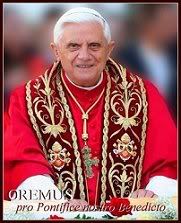 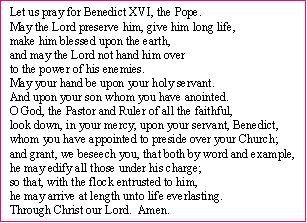 MAUNDY THURSDAY
MAUNDY THURSDAY

 Vatican rejects Bin Laden's
Vatican rejects Bin Laden's
new 'crusade' charges
By Philip Pullella
VATICAN CITY, Mar. 20 (Reuters) - The Vatican rejected on Thursday new accusations by Al Qaeda leader Osama bin Laden that the publication of cartoons mocking Islam's Prophet Mohammad was part of a "new crusade" involving Pope Benedict.
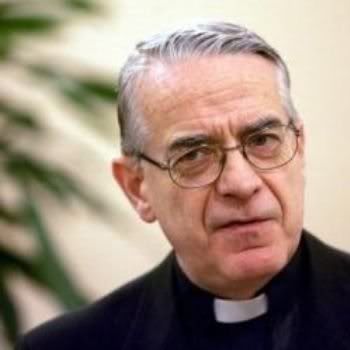
"These accusations are totally unfounded," the chief Vatican spokesman Rev. Federico Lombardi told Reuters, in response to an audio recording by Bin Laden which was posted on the Internet to coincide with the birthday of the founder of Islam.
Italian security officials were examining the new Bin Laden message and its impact on the Pope, who is heading into busy Easter weekend celebrations.
"Obviously we can't ignore it but at this moment that doesn't mean the threat is being taken seriously," said an Italian security source, though other sources told local news agency Ansa it was being seen as serious.
The Saudi-born militant leader said Europe would be punished for the cartoons, which were first published by a Danish paper in September 2005 and unleashed a bloody reaction after other newspapers around the world reprinted them the following year.
Last month several Danish newspapers republished one of the cartoons in solidarity with the cartoonist after three men were arrested on suspicion of plans to kill him. This sparked a fresh outburst of protest by Muslims.
"Your publications of these drawings -- part of a new crusade in which the Pope of the Vatican had a significant role -- is a confirmation from you that the war continues," said bin Laden, addressing "those who are wise at the European Union."
Lombardi said bin Laden's accusations were not surprising.
"It is natural to think that he would lump the Vatican and the Pope together with all his perceived enemies. But this is not correct," he said.
He recalled that the Pope himself had been quick to condemn the Danish cartoons and launched a wider criticism of depictions of religious figures that offend members of different faiths.
Just last month the Vatican's top official for relations with Islam, Cardinal Jean-Louis Tauran, jointly condemned the cartoons along with an official at al-Azhar University, Egypt's major centre of Sunni Islamic learning.
Lombardi pointed out that Pope Benedict also recently set up a permanent official dialogue with Muslim leaders.
Al Qaeda often criticizes the Pope. Many Muslims were offended by a 2006 speech he made which they perceived as depicting Islam as a violent faith.
Its second-in-command Ayman al-Zawahri said in December Benedict had "insulted Islam and Muslims" and criticized Saudi Arabia's King Abdullah for meeting him.
European countries singled out by Al Qaeda in the past include Britain, Spain, Italy and Denmark. The new message is likely to cause particular concern to Denmark.
The European Union refused to comment to the latest provocation by Bin Laden. A spokeswoman for EU foreign policy chief Javier Solana said: "We have seen messages of Bin Laden on other occasions, our response is not to comment them."
The Dutch government has said it fears the same kind of backlash as over the cartoons when a right-wing lawmaker releases a film critical of the Koran, which he says he will do this month online after cinemas refused to show it.
Bin Laden says Pope helps
anti-Islam Crusade
By PAUL SCHEMM
CAIRO, Egypt, Mar. 20 (AP) - Osama bin Laden accused Pope Benedict XVI of helping in a "new Crusade" against Islam and warned of a "severe" reaction to European publications of cartoons of the Prophet Muhammad that insulted many Muslims.
Bin Laden's new audiotape message raised concerns al-Qaida was plotting new attacks in Europe. Some experts said bin Laden, believed to be in hiding in the rugged Afghan-Pakistan border area, may be unable to organize an attack himself and instead is trying to fan anger and inspire his supporters to violence.
The Vatican spokesman, the Rev. Federico Lombardi, said bin Laden's accusation that the Pope has played a role in a worldwide campaign against Islam is "baseless."
Lombardi said the Pope on several occasions has criticized the cartoons, first published in several European newspapers in 2006 and republished by Danish papers in February.
The Pope angered many in the Muslim world in 2006, when he cited a medieval text that characterized some of the teachings of the Prophet Muhammad as "evil and inhuman," particularly "his command to spread by the sword the faith."
The Pope later said he was "deeply sorry" and stressed the remarks did not reflect his own opinions. He has since led a public campaign for dialogue with Muslims.
Bin Laden's audiotape was posted late Wednesday on a militant Web site that has carried al-Qaida statements in the past and bore the logo of the extremist group's media wing Al-Sahab.
"The response will be what you see and not what you hear and let our mothers bereave us if we do not make victorious our messenger of God," said a voice believed to be Bin Laden's, without specifying what action would be taken.
He said the cartoons " came in the framework of a new Crusade in which the Pope of the Vatican has played a large, lengthy role," according to a transcript released by the SITE Institute, a U.S. group that monitors terror messages.
"You went overboard in your unbelief and freed yourselves of the etiquettes of dispute and fighting and went to the extent of publishing these insulting drawings," he said. "This is the greater and more serious tragedy, and reckoning for it will be more severe."
The five-minute message, Bin Laden's first this year, came as the Muslim world marks the Prophet Muhammad's birthday on Thursday. It made no mention of the fifth anniversary Wednesday of the U.S.-led invasion in Iraq.
A U.S. counterterrorism official in Washington said "CIA analysis assesses with a high degree of confidence it is Osama bin Laden's voice on the tape" and that there was "no reason to doubt bin Laden is alive."
The official spoke on condition of anonymity because of the intelligence matters involved.
On Feb. 13, Danish newspapers republished one of the cartoons, which shows Muhammad wearing a bomb-shaped turban, to illustrate their commitment to freedom of speech after police said they had uncovered the beginnings of a plot to kill the artist.
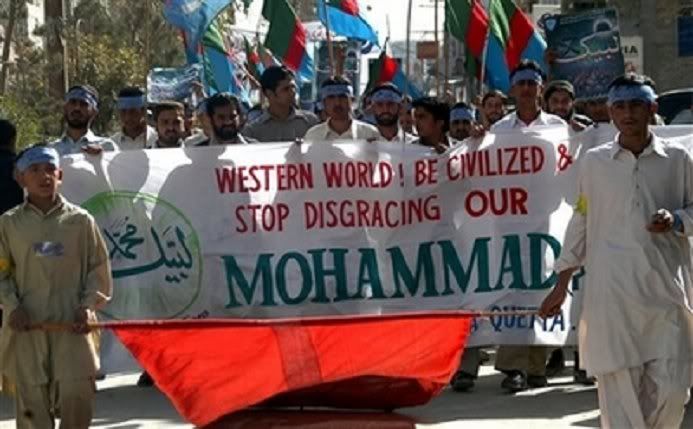
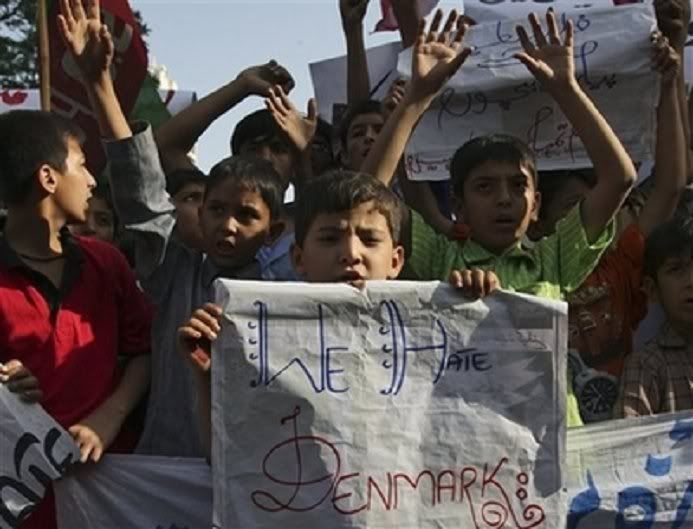 Demonstration against the Mohammed cartons in Karachi, Pakistan, yesterday, 3/19.
Demonstration against the Mohammed cartons in Karachi, Pakistan, yesterday, 3/19.
NB: None of the new demos so far have targeted Pope Benedict.
Muslims widely saw the cartoons as an insult, depicting the prophet as violent. Islamic law generally opposes any depiction of the prophet, even favorable, for fear it could lead to idolatry.
The original 12 cartoons, first published in a Danish newspaper and then in several papers across Europe, triggered major protests in Muslim countries in 2006.
There have been renewed protests in the last month, though not as large or widespread. A few dozen university students waved banners and chanted slogans against Denmark on Thursday in Islamabad. The students said they had not seen the Bin Laden message.
Ben Venzke, the head of IntelCenter, a U.S. group that monitors militant messages, called Wednesday's message a "clear threat against EU member countries and an indicator of a possible upcoming significant attack."
Talat Masood, a retired Pakistani general and security analyst, said Bin Laden was likely too isolated to organize an attack. But the al-Qaida leader may be hoping to use anger over the cartoons to inspire violence, he said.
"Even if he has not got the capacity (to launch an attack), he will try to infuse hatred," Masood said.
Denmark's intelligence agency said Thursday that Bin Laden's warnings "don't immediately give reason to change" its assessment of the threat level against the country.
Last week, the intelligence agency had warned that reprinting the cartoon had brought "negative attention" to Denmark and may have increased the risk to Danes at home and abroad.
Associated Press writers Maamoun Youssef in Cairo, Egypt and Lily Hindy in New York contributed to this report.
[Modificato da TERESA BENEDETTA 20/03/2008 20:08] |
|
 20/03/2008 19:44 20/03/2008 19:44 |
|
| | | OFFLINE | | Post: 12.478 | Registrato il: 28/08/2005
| Utente Gold | |
|
MASS OF THE CHRISM
MAUNDY THURSDAY
 A full translation of the Holy Father's homily has been posted in
A full translation of the Holy Father's homily has been posted in HOMILIES, DISCOURSES, MESSAGES.
Pope launches Easter celebrations
with Holy Thursday Mass
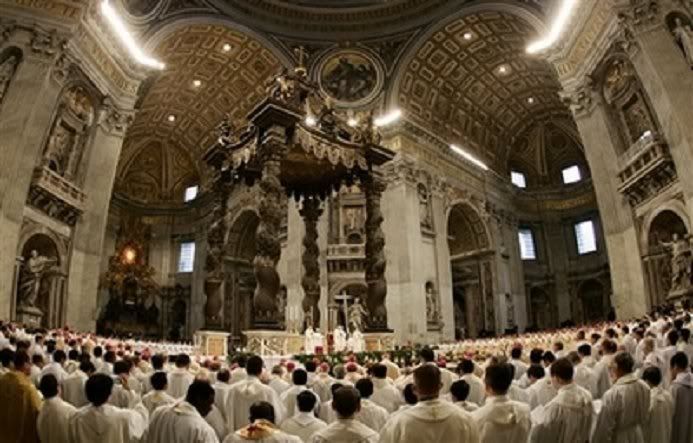
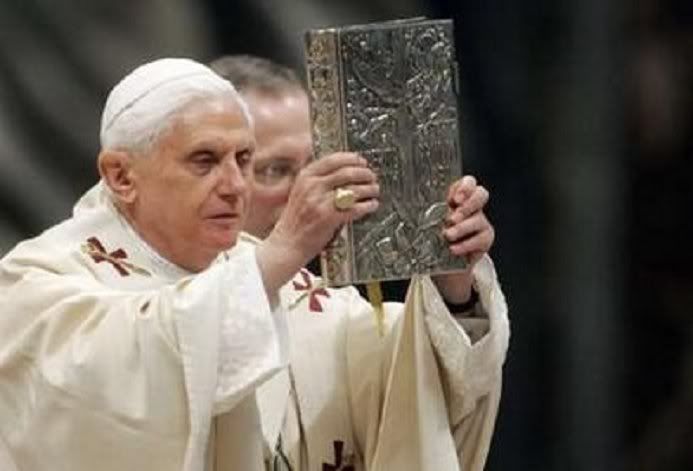
VATICAN CITY, Mar. 20 (AFP) - Pope Benedict XVI celebrated Holy Thursday Mass at St Peter's Basilica as part of Easter celebrations that will culminate in his traditional "urbi et orbi" (to the city and the world) message Sunday.
Benedict was to preside over another Mass later Thursday at Rome's St John in Lateran Basilica commemorating Christ's Last Supper with his disciples, during which the Pope will perform a ritual "washing of the feet."
The Gospels say that Jesus, both God and man at the same time, washed the feet of the apostles on this occasion to signify that he was putting himself at the service of humanity.
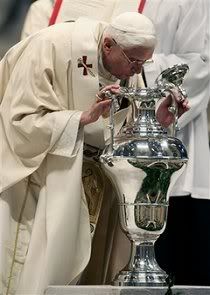 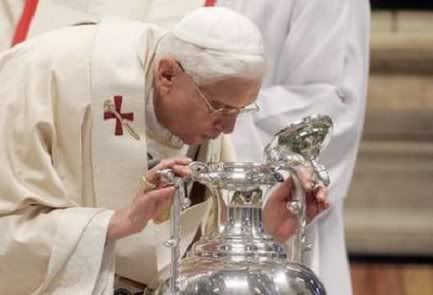
During the Chrism Mass Thursday morning, celebrated by bishops of every diocese in the Roman Catholic world, the oil to be used in the coming year for baptisms and other sacraments is blessed, and all priests renew their vows.
In his homily, the Pope said one could not be truly free without submitting to the will of God.
He decried "the temptation to be totally autonomous, to follow only one's own will ... to think that man cannot be completely man except through this unlimited freedom."
On Good Friday the Pope will preside over the "celebration of the Passion" at St Peter's Basilica before proceeding to the Colosseum, in central Rome, where he will take part in the Way of the Cross procession commemorating the path Jesus took to his crucifixion.
This year, however, the 80-year-old pope will observe most of the event from the Palatine Hill overlooking the Colosseum, and will walk for only the final three of the 14 Stations of the Cross.
The last two years Benedict, who was elected in 2005, took part in the entire walk, carrying the cross at the first and last stations.
Saturday evening Benedict will return to St Peter's for an Easter vigil.
Easter Mass on Sunday will be celebrated in St Peter's Square, to be followed by the Pope's "urbi et orbi" blessing.
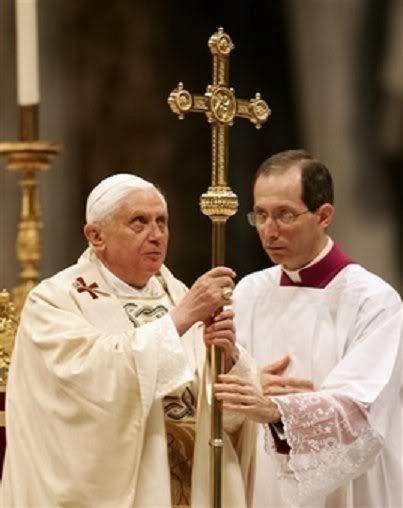 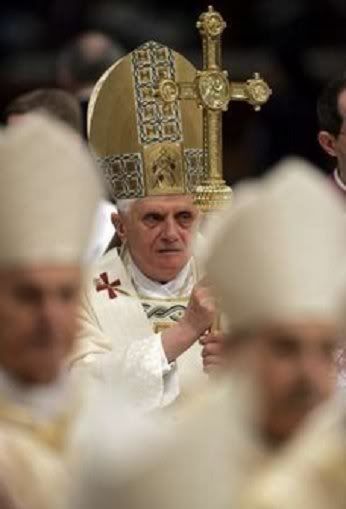
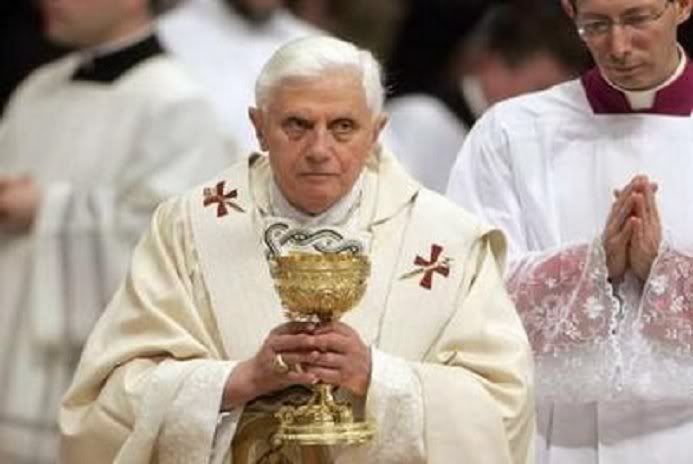
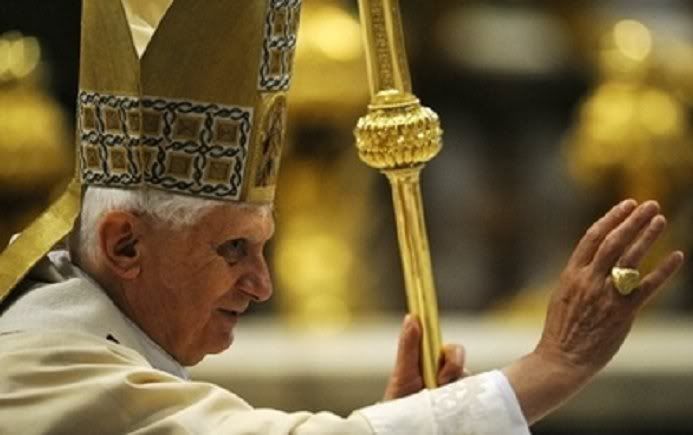
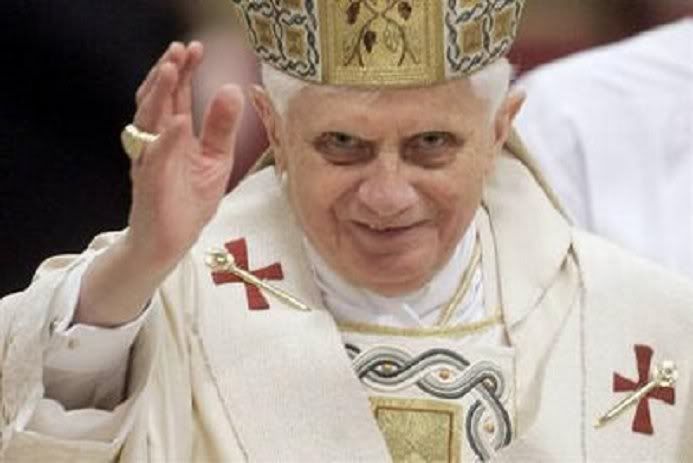
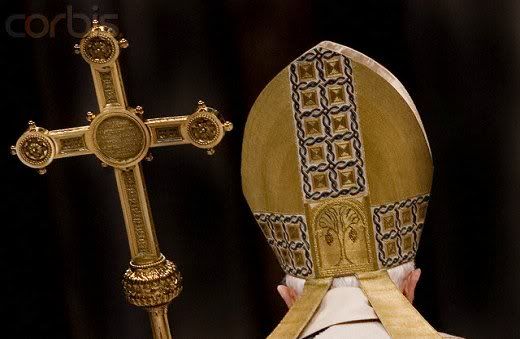 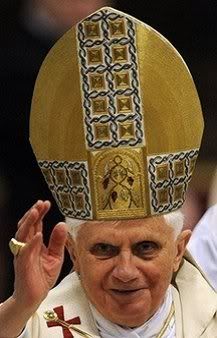 Traditional Cross, contemporary miter. Note the date-palm motif on the back of the mitre - quite Jewish!
Traditional Cross, contemporary miter. Note the date-palm motif on the back of the mitre - quite Jewish!
The motif in front is very unusual - it suggests the human figure but it also has the grapes motif.
[Modificato da TERESA BENEDETTA 23/03/2008 02:57] |
 20/03/2008 20:20 20/03/2008 20:20 |
|
| | | OFFLINE | | Post: 12.480 | Registrato il: 28/08/2005
| Utente Gold | |
|
MASS OF THE LORD'S SUPPER
Basilica of St. John Lateran
MAUNDY THURSDAY
 A full translation of the Pope's homily has been posted in
A full translation of the Pope's homily has been posted in HOMILIES, DISCOURSES, MESSAGES.
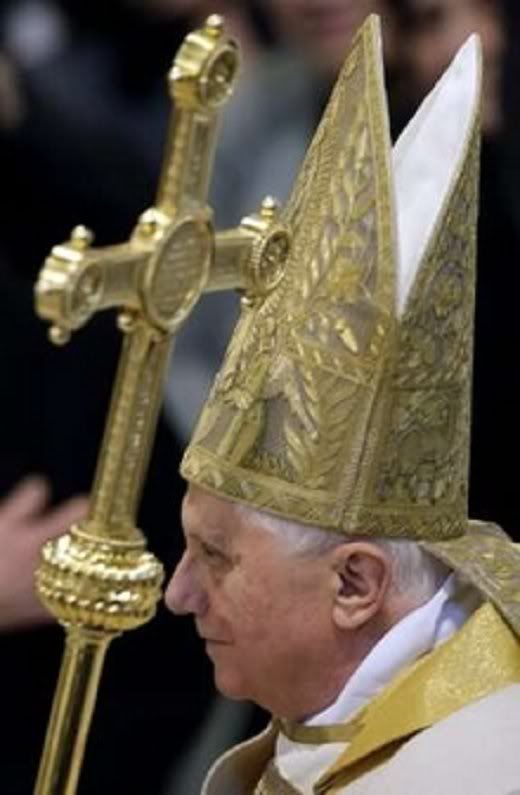
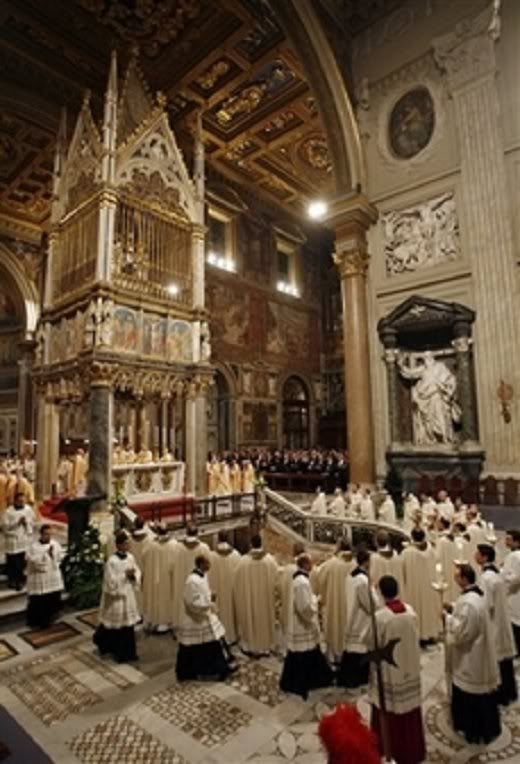
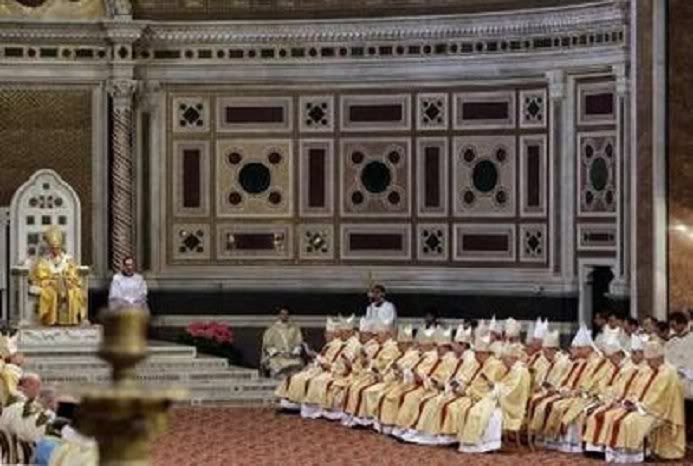
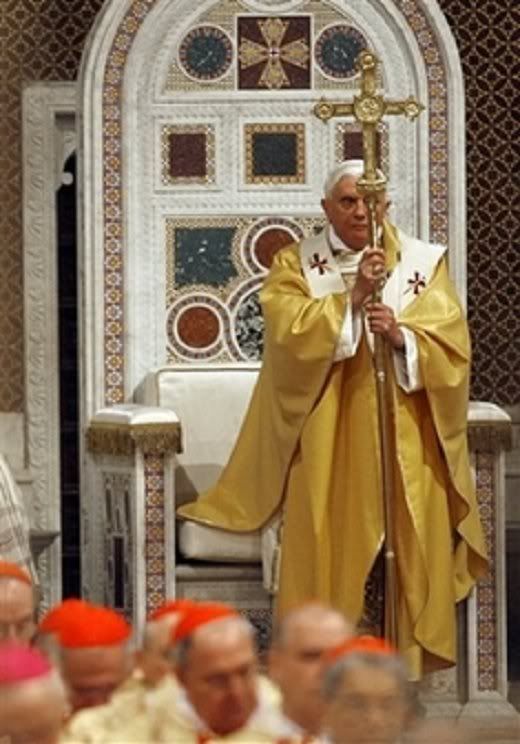 Pope leads Holy Thursday service
Pope leads Holy Thursday service
By FRANCES D'EMILIO
ROME, Marc. 10 (AP) - Pope Benedict XVI washed the feet of a dozen priests in a Holy Thursday ceremony to symbolize humility and he urged people to set aside any rancor toward others.
There was no noticeable increase in Vatican security — already heavy for the pontiff's public appearances — after the release of an audiotape in which Osama bin Laden accuses the Pope of helping in a "new Crusade" against Islam.
Holy Week culminates in an Easter vigil Mass Saturday night in St. Peter's Basilica and Mass on Easter morning in St. Peter's Square. The Pope will also preside over a cross-carrying procession Friday night at the Colosseum.
The Holy Thursday ceremony in St. John Lateran Basilica commemorated Jesus's Last Supper with his 12 apostles on the evening before his Good Friday crucifixion.
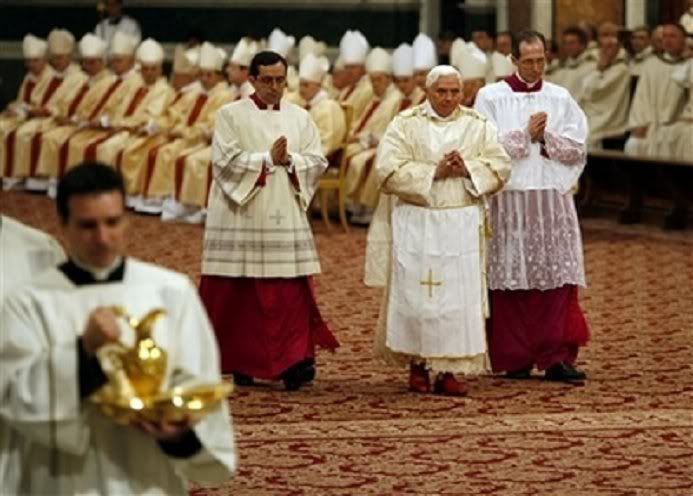
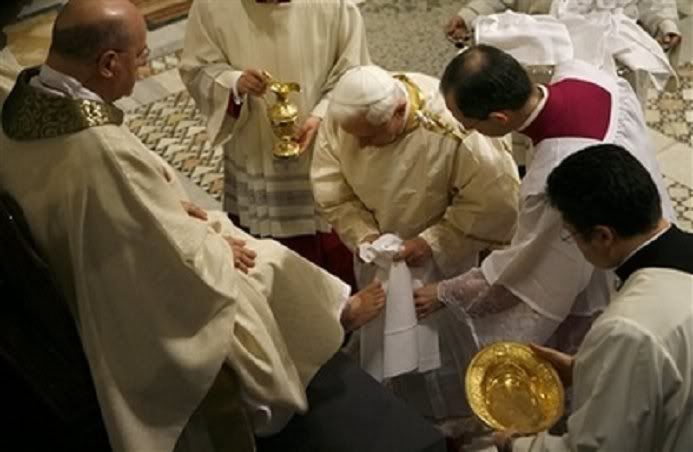
In his homily, Benedict described Jesus's washing the feet of his apostles as a purification whose symbolism is still valid today.
"Day after day, we are covered with various kinds of dirtiness, with empty words, with prejudices ... falsehoods," the pontiff said. "All this darkens and contaminates our soul," he said.
"We must wash each other's feet also in the sense that we pardon each other anew," the Pope said, adding: "Don't let rancor toward each other poison our soul."
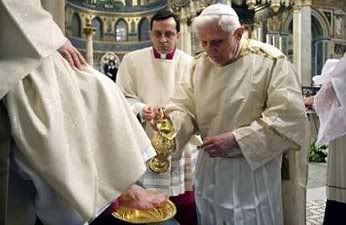 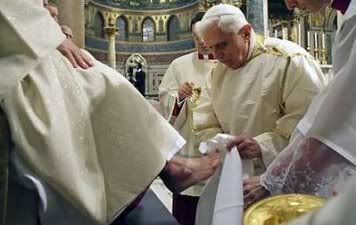
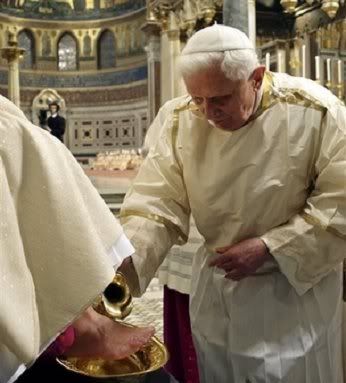 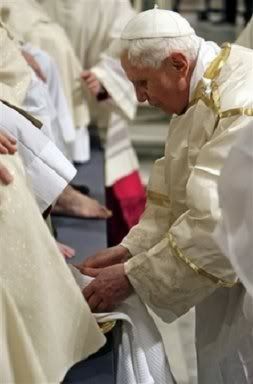
Then the 80-year-old Pontiff washed one foot of each of 12, white-robed priests sitting in a row on a raised platform. He poured water from a gold-plated pitcher over each bare foot extended over a basin and, with a white cloth, dabbed the feet dry.
The Vatican said the collection of money at the Holy Thursday Mass will be given to an orphanage in Havana, Cuba.
The Pope's Holy Week appearances are among huge crowds of faithful, despite Osama bin Laden's message against the Pope posted Wednesday night on a militant Web site. The message raised concerns al-Qaida was plotting new attacks in Europe or that Nin Laden was trying to inspire his supporters to violence.
On Thursday, the chief Vatican spokesman, the Rev. Federico Lombardi, described Bin Laden's contention that Benedict had played a role in a worldwide campaign against Islam as "baseless."
Pope Benedict XVI performs
Holy Thursday rites
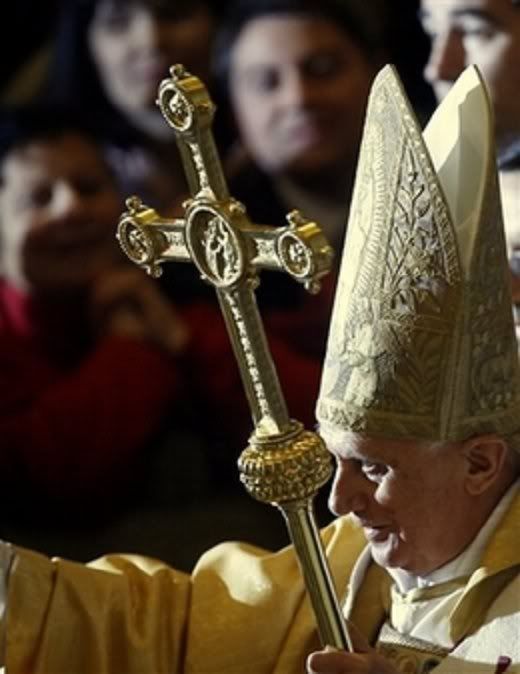
ROME, Mar. 20 (dpa) - Pope Benedict XVI commemorated Jesus's Last Supper with Holy Thursday Mass in Rome's Basilica of St John in Lateran.
During the late afternoon ceremony, the Pontiff washed the feet of 12 priests, a traditional gesture recalling Jesus' act of humility to his disciples at the last meal he shared with them before his death.
"Day after day we are all covered in a multi-form dirt, of empty words, prejudice, reduced and altered knowledge, a multiplicity of semi-falsehoods or falsehoods that continue to infiltrate through to our most intimate part," Benedict said in his homily.
But "if we welcome the words of God with an attentive heart, then they will reveal a real cleansing, a purification of the soul, of the interior of man," he added.
Funds during the collection were to be destined by the pope to the La Edad de Oro, an orphanage in Havana, Cuba, the Vatican said.
Earlier Thursday, the Pope began the Easter ceremonies by celebrating Holy Chrism Mass in St Peter's during which he consecrated the holy oils used in baptisms and confirmations.
Benedict is scheduled to preside over the traditional Via Crucis (Way of the Cross) procession in Rome's Colosseum on Good Friday and an Easter vigil at the Vatican on Saturday.
On Easter Sunday, he is due to celebrate Mass in St Peter's before delivering his Urbe et Orbi message and blessing "to the city and the world."
Easter celebrates the resurrection of Jesus Christ and is Christians' most important religious feast.
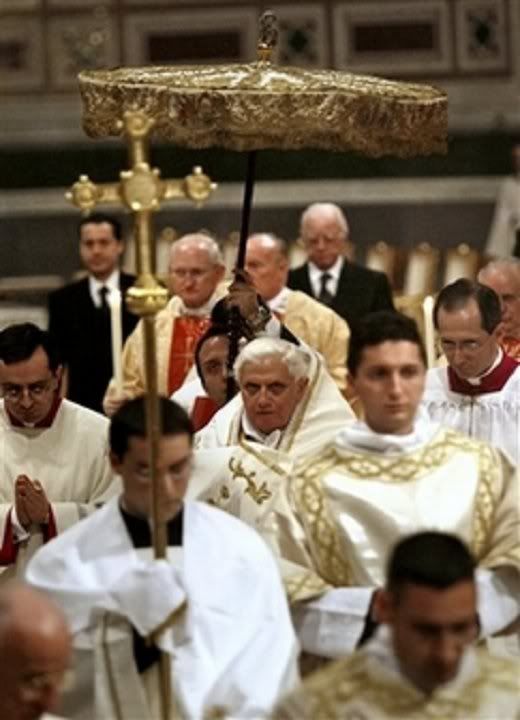
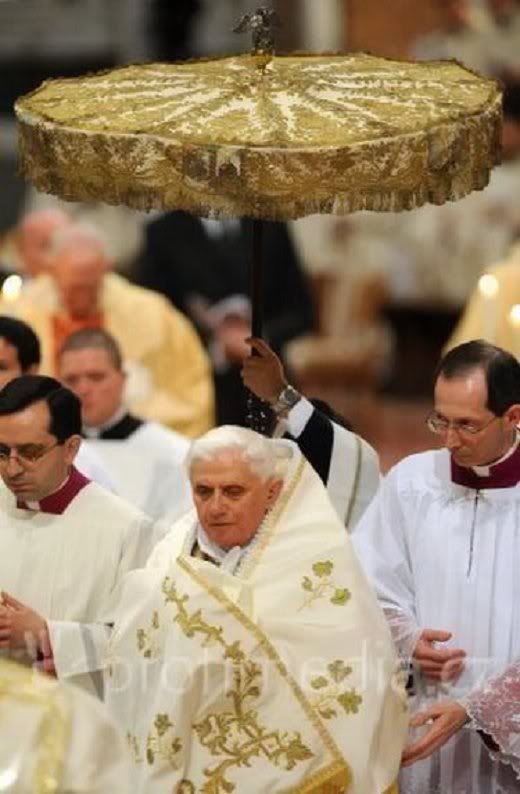
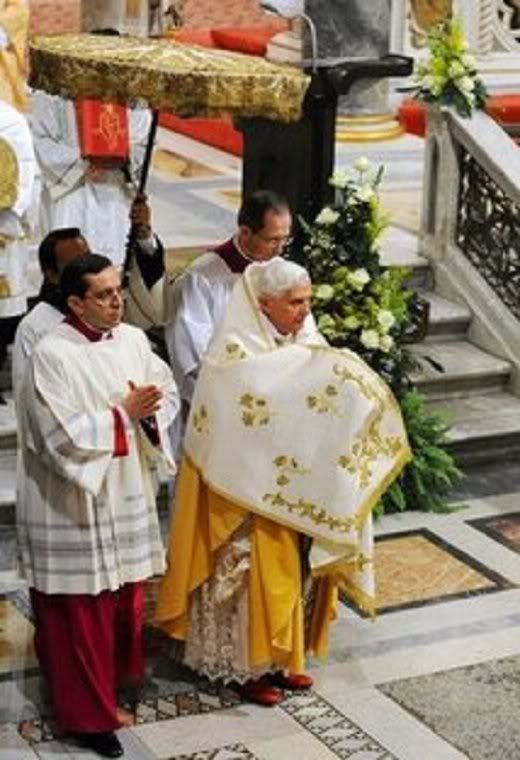 The Holy Father carries the Blessed Sacrament in procession to the Altar of Reposition
The Holy Father carries the Blessed Sacrament in procession to the Altar of Reposition
in the Lateran Basilica for the prayer vigil and adoration which closed out the Maundy
Thursday liturgy. He used a new humeral [shoulder mantle to cover the Blessed Sacrament].
And Mons. Guido has definitely revived the use of the ombrellino as another token
of homage to the Lord.
[Modificato da TERESA BENEDETTA 23/03/2008 02:54] |
 20/03/2008 22:36 20/03/2008 22:36 |
|
| | | OFFLINE | | Post: 12.482 | Registrato il: 28/08/2005
| Utente Gold | |
|
   Saudi official says
Saudi official says
'No churches unless Pope
recognizes prophet Mohammed'
Riyadh, 20 March (AdnKronos) - No churches should be permitted in Saudi Arabia, unless Pope Benedict XVI recognised the prophet Mohammed, according to a Middle East expert.
While Saudi mediators are working with the Vatican on negotiations to allow places of religious worship, some experts believe it will not occur without this recognition.
Anwar Ashiqi, president of the Saudi centre for Middle East strategic studies, endorsed this view in an interview on the site of Arab satellite TV network, al-Arabiya on Thursday.
"I haven taken part in several meetings related to Islamic-Christian dialogue and there have been negotiations on this issue," he said.
"It would be possible to launch official negotiations to construct a church in Saudi Arabia only after the Pope and all the Christian churches recognise the prophet Mohammed."
"If they don't recognise him as a prophet, how can we have a church in the Saudi kingdom?"
Ashiqi's comments came after a declaration launched by the papal nuncio of the Persian Gulf, the Archbishop Mounged El-Hachem, at the opening of the first Catholic church in Qatar last week.
The prelate had announced the launch of "treaties to construct a church in Saudi Arabia where it is banned to practise whatever religion they want outside Islam".
El-Hachem estimated three to four million Christians in the Saudi kingdom who want to have a church.
A member of Saudi Arabia's Consultative Council, Abdelaziz al-Thinani, rejected the prelate's claims saying that there were no Christians among the Saudis who were all Muslims.
"Those few Christians do not reside in the country permanently, they come and go," he said.
He denied there were four million Christians in the kingdom and said the issue of human rights should not be used to call for the construction of a Christian church.
Most of Saudi Arabia's Christians are foreign workers. There are 8.2 million foreign workers in a country of 25.6 million people according to a report by the Saudi Labour Ministry.
====================================================================
What exactly is meant by 'the Pope must recognize Mohammed as a Prophet'? I went back to check what Nostra aetate- the Vatican-II "Declaration ont he Relation of the Church to Non-Christian Religons' - says about Islam. Here is the relevant paragraph, which makes no mention of Mohammed.
3. The Church regards with esteem also the Moslems. They adore the one God, living and subsisting in Himself; merciful and all- powerful, the Creator of heaven and earth,(5) who has spoken to men; they take pains to submit wholeheartedly to even His inscrutable decrees, just as Abraham, with whom the faith of Islam takes pleasure in linking itself, submitted to God. Though they do not acknowledge Jesus as God, they revere Him as a prophet. They also honor Mary, His virgin Mother; at times they even call on her with devotion. In addition, they await the day of judgment when God will render their deserts to all those who have been raised up from the dead. Finally, they value the moral life and worship God especially through prayer, almsgiving and fasting.
Since in the course of centuries not a few quarrels and hostilities have arisen between Christians and Moslems, this sacred synod urges all to forget the past and to work sincerely for mutual understanding and to preserve as well as to promote together for the benefit of all mankind social justice and moral welfare, as well as peace and freedom.
As I do not recall ever reading a statement made or written by Cardinal Ratzinger about Mohammed - not about Islam, but Mohammed - I tried googling 'Ratzinger on Mohammed', but all I am getting back is the Manuel II citation he used in the Regensburg lecture. ...If someone out there has the goods, please share! Thank you.
   Where dialogue with Jews is headed:
Where dialogue with Jews is headed:
Interview with Vatican aide
on Jewish-Catholic relations
By Viktoria Somogyi
ROME, MARCH 19, 2008 (Zenit.org).- The personal witness of Benedict XVI, and before him, Pope John Paul II, plays a key role in the advance of relations between the Church and the Jews, says a Vatican aide.
Father Norbert Hofmann is the secretary of the Commission for Religious Relations With the Jews, within the Pontifical Council for Promoting Christian Unity.
ZENIT spoke with Father Hofmann about the Church's dialogue with the Jews, and particularly about an upcoming international congress to be held in Hungary and to focus on Catholic and Jewish perspectives on civil society and religion.
How does the congress in Budapest fit within the development of relations between the Holy See and the Jewish world?
The Holy See began systematic dialogue with the Jewish world after Vatican Council II, that is, starting in 1965. On the part of the Jews, the International Jewish Committee for Inter-Religious Consultations was founded in 1970. It is an organization that includes almost all the most important Hebrew agencies involved in interreligious dialogue.
From 1970 till now we have organized 19 encounters at the international level. The one we will have in Budapest, Nov. 9-12, will be the 20th. So it is an ongoing development, starting with the declaration from the Council, Nostra Aetate, and over these years we've arrived at quite a good spot.
Could you summarize for us the main stages of the journey that have led to this encounter?
The main purpose inspiring this conference in Budapest is to examine the situation of the dialogue between Catholics and Jews in the Eastern European countries. We chose Budapest because there is a fairly large Jewish community in this city and because the dialogue in this country has made a lot of progress.
We've covered so many important steps since beginning the official dialogue of the Catholic Church with the Jewish world. For example, Pope John Paul II was the first Pope to visit a synagogue, to pray at Auschwitz for the victims of the Shoah, and to go to Israel. He prayed at the Wailing Wall, visited Yad Vashem, the Holocaust monument and museum.
Then, importantly, there is not only the Nostra Aetate document, but also the texts published by the various bishops' conferences. The living witness of John Paul II and now Benedict XVI are even more important.
Six weeks after his election, Benedict XVI received the first Jewish delegation. Then, four months later he visited the synagogue in Cologne; a year later he then visited Auschwitz to pray for the victims of the Shoah. In addition, he intends to visit Israel as well, if the situation if favorable for organizing this visit. Dialogue with the Jews is close to Pope Ratzinger's heart.
After the steps taken in 2006, we organized an encounter in Cape Town, South Africa, to commit ourselves -- Catholics and Jews together -- to fight the AIDS epidemic. In 2004, we were in Buenos Aires, Argentina, to do something for the poor of that country who were going through an economic recession at that time. Then we chose Budapest to be able to examine the situation of Eastern Europe. So Budapest is our door to the East.
Who will be participating?
For our part, half of the participants will come from Hungary, from the Hungarian bishops' conference; there will be cardinals, bishops, experts and professors who have a lot of experience in dialogue with the Jews.
On the part of the Jews, the local community will be involved, but I hope that they invite participants not only from the United States and Israel, but also from Europe and Eastern Europe. We've found that long term dialogue can be stimulated after conferences like these.
What topics will be discussed?
The official topic will be: "Civil and Religious Society, Catholic and Jewish Perspectives." The purpose is to understand what point we are at in the dialogue with the Jews of Eastern Europe. In addition, we want to stimulate the situation in Hungary and in other countries of Eastern Europe in order to deepen Catholic-Jewish dialogue.
What are the major problem-areas of the debate?
The beatification of Pius XII; then the new prayer for Good Friday in the Tridentine Mass that has caused a bit of an uproar. We are now talking with our Jewish partners to clear it up, to balance out the situation.
But we should say that there are so many general problems. For example, we have a hierarchical structure, there's the Pope, the bishops' conference, cardinals; on the other hand, for Jews, there are different agencies. Therefore it is sometimes difficult for them to have a stable structure.
We primarily have a religious interest, and sometimes the Jews want to talk about religion, but for them the cultural, social, and political aspects are also very important.
The other point in which the situation is very difficult is the conflict between Israel and Palestine: This conflict has always cast a shadow on our discussions and has sometimes mixed political affairs with religious affairs. Israel is the only country in the world where Jews are in the majority and Christians are a small minority.
Then also, it is always important to the Jews to fight anti-Semitism. As John Paul II said: Anti-Semitism is a sin against God and against humanity. And so the Jews can be sure they have found an ally in the fight against anti-Semitism.
What are the points of convergence?
There are so many, because spiritually and theologically Christianity has roots in Judaism. Christianity can't be understood without Judaism. As Cardinal Ratzinger once said, for the Jews and for our creed the one and only God is the God of Israel.
There is also the second commandment, that we should help the needy, then the sacred Scriptures as the revelation of God's will, the Ten Commandments, ethics, how to live and completely fulfill oneself as a human being.
Let's say that from a social point of view, we can do a lot together; even in the liturgy, in ethics, there are so many similar elements. The religious foundation is enormous.
On what levels is the dialogue between the Christian and Jewish world happening?
It is happening on the level of religion, social justice, discussions about theological issues, on Judaism's influence on Christianity and vice versa during the Middle Ages, on the Jewish roots. There is an ongoing dialogue to continue to find our own Christian identity.
There is also the level of daily life: in New York, Jews and Catholics live right next to each other. They have to face daily life together, there are so many friendships.
Then there is the parish level, and in every bishops' conference, there is someone responsible for ecumenism and for inter-religious dialogue.
There is also the level of the universal Church regarding the Holy See's Commission for Religious Relations with the Jews, but the true work is done by the bishops' conferences. And because there are few Jews in Asia, the most important dialogue is happening in the United States, Israel and in all the European countries.
[Modificato da TERESA BENEDETTA 21/03/2008 00:04] |
 21/03/2008 12:19 21/03/2008 12:19 |
|
| | | OFFLINE | | Post: 12.489 | Registrato il: 28/08/2005
| Utente Gold | |
|
|
 21/03/2008 12:21 21/03/2008 12:21 |
|
| | | OFFLINE | | Post: 12.490 | Registrato il: 28/08/2005
| Utente Gold | |
|
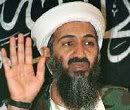  Bin Laden is right:
Bin Laden is right:
Pope Benedict is leading a Crusade -
a crusade for reason
By Father Jonathan Morris
 www.foxnews.com/
www.foxnews.com/
Thursday, March 20, 2008
A new audio recording with a message from Usama bin Laden was posted late yesterday on an Islamic Web site. The Al Qaeda leader threatens the European Union with grave punishment for the numerous re-publications of cartoons mocking Islam’s Prophet Mohammed in European newspapers. “You are testing Muslims,” he said, “the answer will be what you shall see not what you hear.”
Couched between so much cryptic ranting and raving, many analysts are missing what I consider the most important new data in Bin Laden’s newest message. It is a not-so-subtle cue to his Islamist followers: stay away from Pope Benedict XVI!
In his five minute recording, Bin Laden characterizes the publication of the drawings as “part of a new crusade in which the Pope of the Vatican had a significant role.”
Today you likely will hear most reporters and pundits suggest the reference to Benedict is mere mindless babble from a paranoid cave dweller. After all, Pope Benedict XVI himself criticized the publication of the cartoons as an irresponsible provocation of Muslim sensibilities. The Pope explained at the time that the universal right of freedom of expression does not free us from personal responsibility to express ourselves in a respectful way.
But contrary to the mindless babble theory, I think Bin Laden’s cave has a very good antenna and he has become a shrewd decipherer of its signals. In his last two public messages, bin Laden has gone out of his way — way out of his way — to say this Pope in particular is an enemy of Islam. Why?
Note that in yesterday’s message, Bin Laden does not accuse Pope Benedict of involvement in the cartoons. No. He is placing the cartoon flap within the broad context of a “new Crusade” against Islam, in which, according to Bin Laden, the Pope has played a “large and lengthy role.”
Bin Laden’s papal fixation has something to do with Benedict’s now infamous Regensburg address that caused so much stir among some Muslim youth. But that’s not the whole story.
Bin Laden knows Benedict’s crusade neither started nor ended in Regensburg. He also knows and fears this crusade is of a certain type which he and his pals don’t know how to fight, and thus considers it the ultimate threat to his power base, thousands of times more powerful than the backhanded slaps against Mohammed, as were the cartoons.
Bin Laden even knows the crusade is not against Islam.
Benedict’s crusade can be likened to a quiet pilgrimage in the pursuit of rescuing human reason from the clutches of fundamentalism. It aims to restore reason as the great cultural meeting point for people of every race and creed.
While Benedict sees rationality as the only suitable launching pad of all true faith, Bin Laden sees it as the great obstacle to his manipulation of the masses.
While Benedict sees faith and reason as mutually enriching sources of truth, bin Laden sees the former as incompatible with the later. And while Benedict claims God can never command us to do evil because the first universal moral dictate of reason —“do good and avoid evil”— reflects his loving voice, bin Laden on the other hand claims Allah can do whatever he pleases, evil included.
The good news Benedict is preaching is that truth and goodness are of universal attraction. The more Pope Benedict whispers about universals, the more Muslims will listen. And they already are.
Earlier this month the Vatican announced 225 Muslim leaders have asked to enter into official dialogue with Christians to proclaim the need for peace and mutual respect.
Last week the Muslim country of Qatar inaugurated its first official Christian church. After the historic and first ever visit of a Saudi King to the Vatican last year, the two states are now in negotiations to allow the construction of Christian churches in the Kingdom, the holy ground of Mecca and Medina.
These are small, but incredibly significant signs that Muslims too are signing up to fight the crusade.
In other words, bin Laden has every reason to be afraid.
[Modificato da TERESA BENEDETTA 21/03/2008 14:00] |
 21/03/2008 13:47 21/03/2008 13:47 |
|
| | | OFFLINE | | Post: 12.492 | Registrato il: 28/08/2005
| Utente Gold | |
|
GOOD FRIDAY
 REMAINING HOLY WEEK LITURGICAL CELEBRATIONS
REMAINING HOLY WEEK LITURGICAL CELEBRATIONS
TO BE PRESIDED BY HIS HOLINESS BENEDICT XVI
HOLY WEEK
March 21, GOOD FRIDAY
- CELEBRATION OF THE PASSION OF THE LORD
Cappella Papale
17:00 St. Peter's Basilica
The Holy Father will preside at the Liturgy of the Word, the Adoration of the Cross and Communion.
VIA CRUCIS
21:15 Colosseum
The Holy Father will preside at the Way of the Cross, at the end of which he will address the faithful
and impart the Apostolic Blessing.
The Vatican's English translation of Cardinal Zen's meditations and prayers for the Via Crucis tonight has been posted on
www.zenit.org/article-22117?l=english
About tonight's Via Crucis at the Colosseum:
-The Holy Father will preside at the opening and closing from the terrace on the Palatine Hill overlooking the Colosseum.
- He will not make the Stations of the Cross on foot the whole way - only the last three.
- Traditionally, the Cross will be carried to the first station by Cardinal Camillo Ruini as the Pope's Vicar for Rome. He will lead the rest of the Stations until the 11th.
- The rest of the Cross bearers for the evening (second to 11th stations) include a Roman family, a nun from Burkina Faso (Africa), a handicapped lady on a wheelchair with two assistants, two Franciscan friars from the Custody of the Holy Land, and a Chinese girl, who will hand on the Cross to the Holy Father for the last 3 stations.
March 22-23 EASTER SUNDAY
- EASTER VIGIL
Cappella Papale
21:00 St. Peter's Basilica
Basilica Vaticana: ore 21
The Holy Father will bless the new fire in the atrium of the Basilica.
After the processional entry with the Paschal Candle to the singing of the Exsultet, he will preside
at the Liturgy of the Word, the Baptismal Liturgy and the Eucharistic Liturgy, concelebrated
with the Cardinals.
- EASTER MASS
10:30 St. Peter's Square
The Holy Father will celebrate the Mass.
- 'URBI ET ORBI' BLESSING
12:00 Central Loggia, St. Peter's Basilica
=====================================================================
The entire tormented reality
of the Chinese Church
in the meditations of Cardinal Zen
by Franco Pisano
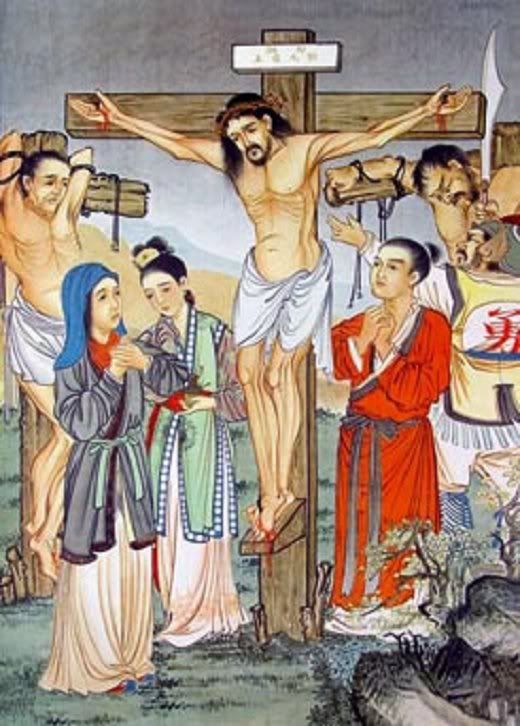
Rome, Mar. 21 (AsiaNews) - The lack of religious freedom and the injustices done by the state, the "betrayal" of some bishops and the faithfulness of those who are persecuted, the hope and expectation of the Church's "victory" and the prayer to be "like the grain of wheat".
The entire reality of the Chinese Church is contained in the meditations that Cardinal Zen prepared for the Way of the Cross this year. Calling things by their name, without diplomatic tact, as understandable as this might be. Besides, he wrote in the presentation, "the Pope wanted me to bring to the Colosseum the voice of those faraway sisters and brothers".
And also the voice of their persecutors. About them, at the beginning the cardinal confesses: "I had to make a great effort to purify myself from my hardly charitable sentiments toward those who made Jesus suffer, and those who in today's world are making our brothers suffer".
But, when Jesus promises the kingdom to the good thief, the request "remember us" unites "friends and enemies" and even "the persecutors of our friends".
The meditations on the stations of the Way of the Cross open with the statement that "the Colosseums have been multiplied down through the centuries, wherever our brothers, in various parts of the world, are still persecuted today in the continuation of Your Passion". This destiny also touches the Church, which "is passing through the dark hour of persecution".
Further on, at the moment of the judgment of Pilate, suffering becomes prayer: "illuminate the conscience of so many people in authority, so that they may recognise the innocence of your followers. Give them the courage to respect religious freedom".
And again, it becomes solidarity with the mothers of the persecuted, evoked by the meeting of Jesus with the women. "We think", writes the cardinal, "of the mothers of so many young people who are persecuted and imprisoned on account of Christ. How many long nights have these mothers spent in sleeplessness and tears. We think of the mothers who, risking arrest and persecution, have continued to pray with their families, fostering in their hearts the hope for better times".
The stages along the path of Jesus continue to be woven together with references to the realities of the Chinese Church, even if these are not specifically named. Thus, at the betrayal of Judas, Cardinal Zen comments: "betrayal is a surprise, above all when it also involves the shepherds of the flock".
And again: "Temptations, threats, and extortion sway the will. But what a scandal! What suffering for the heart of Lord! Let us not be scandalised! Defections have never been lacking during persecution. And after, there often come returns". And they too, like the persecutors, are remembered in prayer.
At the twelfth station, the prayer addressed to Jesus and Mary says: "Accept the repentance of all of us, who because of our weakness are always exposed to the risk of betrayal, denial, and desertion", and "accept the homage of fidelity of all of those who have followed the example of Saint John, who remained courageously beside the cross".
"Protect the men that you have chosen, Lord", the cardinal continues, when he recalls the betrayal of Peter, "so that the gates of hell may never prevail over Your servants".
These, in the final prayer, return to follow the will of God. "Are we right", he asks, "to be in a hurry and to demand to see an immediate victory for the Church? Is it not, perhaps, our own victory that we are anxious to see? Lord, make us persevere in standing beside the Church of silence, and in accepting to disappear and die like the grain of wheat".
[Modificato da TERESA BENEDETTA 21/03/2008 20:17] |
 21/03/2008 14:22 21/03/2008 14:22 |
|
| | | OFFLINE | | Post: 12.495 | Registrato il: 28/08/2005
| Utente Gold | |
|
THE POLITICAL SWIRL BEYOND THE VATICAN
AS THE CHURCH COMMEMORATES GOOD FRIDAY
GOOD FRIDAY


  Vatican-China ties colour
Vatican-China ties colour
Good Friday procession
VATICAN CITY, Mqr. 21 (AFP) — Pope Benedict XVI's observance of the traditional Good Friday procession at Rome's Colosseum will have distinctly Chinese overtones at a time of delicate relations between the Vatican and Beijing.
While the situation of China's Roman Catholics will be at the heart of a meditation to be offered by Cardinal Joseph Zen Ze-Kiun of Hong Kong, the unrest in Tibet has taken the spotlight in bilateral relations.
The Pope broke his silence on Tibet during his weekly general audience on Wednesday when he advocated dialogue, saying: "Violence does not resolve problems, it only aggravates them."
Meanwhile on Thursday, the religious affairs news agency I.Media reported that a Chinese government delegation had a secret meeting at the Vatican on Tuesday.
The unconfirmed talks were planned long before the outbreak of violence in Tibet, the agency said.
Vatican spokesman Federico Lombardi refused all comment on the meeting, not even confirming or denying it took place.
Any such meeting would be highly unusual, as China and the Vatican have not had diplomatic relations for more than half a century.
Cardinal Zen, who is to lead the long-planned Way of the Cross procession which is to begin at 9:15 pm (2015 GMT) at Rome's Colosseum on Friday, is a key figure for Asian Catholics including those in China who are split between the official and clandestine Catholic churches. [Factual error! Cardinal Zen is back in Hongkong, and has explained to the media he felt it was best he spent Good Friday with his own parishioners.]
According to an advance text released by the Vatican, Zen will refer to "living martyrs of the 21st century."
"The Pope wanted me to speak for our brothers and sisters" in Asia, Zen will say at the start of his meditation.
[The quotations given by AFP are from the published 2008 Via Crucis Meditations and Prayers. Caridnal Zen will not be pronouncing them.]
The observance is held every year at the Colosseum where, according to legend, early Christians were thrown to the lions.
Zen will also say that Pontius Pilate, the Roman governor of Jerusalem who approved the death sentence for Jesus, was the "symbol of all those who use authority as an instrument of power and don't concern themselves with justice."
A brochure published by the Vatican to accompany the event is illustrated with Chinese artworks representing each of the 14 Stations of the Cross.
According to the programme of the Way of the Cross procession released by the Vatican, a Chinese woman will pass the cross to the pope at the 12th station, and he will carry it for the final three legs.
During the Easter vigil on Saturday, one of the six adults Benedict is to baptise is Chinese.
The Vatican has not had official diplomatic relations with China since 1951, but is working towards a reconciliation with Beijing in order to win greater freedom of worship for the Catholic faithful, and allow the pope to appoint bishops in China.
Between eight and 12 million "underground" Catholics are loyal to the pope in China, worshipping in makeshift churches, while another five million belong to the government-led church.
Last week Vatican diplomats met for three days with bishops from Taiwan, Macau and Hong Kong.
The Vatican says it will abandon ties with Taiwan in favour of Beijing if China guarantees religious freedom and allows the pope to name Chinese bishops.
Beijing has imposed two conditions on the restoration of ties -- the Vatican's recognition of the one-China policy that precludes independence for Taiwan and its acceptance that religious affairs are an internal Chinese matter.
  Tibet casts shadow over
Tibet casts shadow over
Vatican's China-themed Easter
by Martine Nouaille
ROME, March 21(AFP) - Events in Tibet cast a shadow on Friday over the Vatican's Easter observances, which have Chinese overtones this year to reflect Pope Benedict XVI's advocacy of greater freedom for China's tiny Catholic minority.
Long before Beijing's massive clampdown on protests in Tibet, Pope Benedict XVI asked outspoken Hong Kong Cardinal Joseph Zen to pen the meditations for the traditional Good Friday procession at Rome's Colosseum.
Zen is a key figure for Asian Catholics including those in China who are split between the official and clandestine Catholic churches.
According to an advance text released by the Vatican, Zen's text will refer to "living martyrs of the 21st century," a theme that is unusually political compared to other years.
"The Pope wanted me to speak for our brothers and sisters" in Asia, Zen wrote for the ceremony that will get under way at 9:15 pm (2015 GMT) at Rome's Colosseum, where legend has it that early Christians were thrown to the lions.
The Way of the Cross, for Christians, commemorates the martyrdom and death of Christ.
In one of the meditations to be read out at the event, Zen wrote that Pontius Pilate, the Roman governor of Jerusalem who approved the death sentence for Jesus, was the "symbol of all those who use authority as an instrument of power and don't concern themselves with justice."
Chinese elements feature in several Easter events this year.
A brochure published by the Vatican to accompany the Colosseum procession is illustrated with Chinese artworks representing each of the 14 Stations of the Cross, while a Chinese woman will pass the cross to the pope at the 12th station, and he will carry it for the final three legs.
And during the Easter vigil on Saturday, one of the six adults Benedict is to baptise is Chinese.
The Pope broke his silence on Tibet during his weekly general audience on Wednesday when he appealed for "dialogue and tolerance" on both sides.
Beijing brushed off the urging, according to Italian press reports that quoted foreign ministry spokesman Qin Gang as saying Thursday: "Supposed tolerance cannot exist for criminals who should be punished by the law."
The "terse and abrupt (response) shows the limits of the dialogue under way between the (Chinese) regime leaders and the Catholic Church," the daily La Repubblica said in an editorial. [Of all the Italian newspapers, AFP had to quote the notoriously anti-clerical, anti-Church Repubblica!]
The crisis in Tibet has coincided with surprising movement towards rapprochement 57 years after Beijing severed ties with the Holy See over its recognition of Taiwan.
A papal commission on relations with Beijing last week urged "a respectful and constructive dialogue" with China.
And according to an unconfirmed press leak on Thursday, a Chinese government delegation had a secret meeting at the Vatican on Tuesday, four months after a Vatican delegation travelled to Beijing.
Renewing ties would help Beijing improve its image overseas, while the Pope's discretion on Tibet was seen as a deliberate bid to avoid antagonising the Chinese authorities.
The Vatican is working towards reconciliation with Beijing in order to win greater freedom of worship for the Catholic faithful, and allow the Pope to appoint bishops in China.
The Vatican estimates the number of Catholics in China at between 8-12 million [the number is the equivalent to the entire population of many small nations, even those inEurope!], while it recognises 90 percent of bishops in the official Chinese Catholic Church.
The Holy See says it will abandon ties with Taiwan in favour of Beijing if China guarantees religious freedom and allows the Pope to name Chinese bishops.
Beijing has imposed two conditions on the restoration of ties -- the Vatican's recognition of the one-China policy that precludes independence for Taiwan and its acceptance that religious affairs are an internal Chinese matter.
For the first time this year, the 80-year-old Benedict will observe most of the Way of the Cross procession from the Palatine Hill overlooking the Colosseum, and will walk for only the final three of the 14 Stations of the Cross.
The last two years Benedict, who was elected in 2005, took part in the entire walk, carrying the cross at the first and last stations.
  The Vatican's 'double face',
The Vatican's 'double face',
according to Beijing
Rome, Mar. 21 (AsiaNews) - "The Vatican presents itself to us with a double face": while it is seeking diplomatic relations with Beijing, in reality it wants to return to "the control and management of the Catholic Church in China".
And again: "the Vatican hates socialism", but for it, opening the doors of China "is among the most important missions of the 'strategy of the new millennium' for the Catholic Church", a means of acquiring political power and becoming once again "the Centre of the world". At this point, "Cuba is administered by them [by the Vatican]. Vietnam is administered by them. Among the socialist countries, only China has continued to ignore them".
These are only a few of the weighty statements made by Ye Xiaowen, director of the state administration for religious affairs, a ministry of the Chinese government.
The statements are part of a long interview granted by Ye to the weekly Nan Fang last March 13. The weighty accusations against the Vatican and against Benedict XVI are even more significant if one considers that this interview was published while in Vatican City a Chinese delegation was meeting with members of the Secretariat of state to study - according to information leaked by the Vatican - the possible steps for restoring the diplomatic relations interrupted by Beijing in 1951, with the expulsion of the nuncio at the time.
The question that many are asking is this: Why - with a delegation at the Vatican to speak about future diplomatic relations - would a member of the same government continue to express outworn and closed positions?
Some observers think that there is division in the Chinese leadership, between those who want greater openness and freedom and those who remain bound to Maoist and Stalinist perspectives. Others think that Beijing is simply playing a double game, in keeping with Chinese tradition.
In this case, the overtures of the Chinese delegation and Beijing's desire to establish diplomatic relations would simply be a means of "pacifying" the Vatican while China comes into the spotlight with the Olympics.
An expert on China has even told AsiaNews: "Don't worry; after the Olympics, everything will go back to the way it was".
In his long interview, Ye speaks of "a conflict between China and the Vatican" that has lasted for more than half a century. In his view, the letter from Benedict XVI to the Chinese Catholics is to be appreciated for its limitation of the faculties of the underground bishops, but otherwise "it is a step backward" because it forces "Chinese Catholics to remain completely united to the pope, forcing them once again to choose between their party and the Church".
And citing a Chinese expert on religious questions [Liu Bainian, vice president of the patriotic association?], he affirms that "the publication of the pastoral letter demonstrates that the Pope is continuing along the path of opposition to Beijing".
The "danger" of Benedict XVI's letter lies in the fact that it "publicly denies [the value of] the patriotic association; it rejects the episcopal conference [the council of Chinese bishops, which the Holy See maintains is defective because it does not include the unauthorised bishops and does not have approval from Rome]; it denies the principle of independence, autonomy, and the self-direction [of the Church]", above all in the appointment of bishops.
In his letter published last June, Benedict XVI asked the Chinese authorities for religious freedom, especially in the appointment of bishops, because this "touches the very heart of the life of the Church", explaining that this responsibility is not a question of "a political authority, unduly asserting itself in the internal affairs of a State and offending against its sovereignty".
For Ye Xiaowen, "continuing to maintain the principles of independence, autonomy, and self-direction is the supreme interest of the Chinese nation".
The interview also dealt with other "political" topics, including the problem of Taiwan. "The Vatican", Ye asserts, "recognises the illegitimate power of Taiwan, and does not recognise the People's Republic of China as the only legitimate government". From this, he concludes that anyone who has "secret contact with the Vatican . . . lacks the sense of patriotism that a Chinese citizen should have".
Another hot topic is the canonisation of the Chinese martyrs in 2000, in which the Vatican, "in spite of our objections, carried out a 'canonisation' on our national holiday, proclaiming all of those missionaries judged as saints by the people of the countryside. Among these 'saints', some were shameless libertines, while others were guilty of horrendous crimes".
Various Chinese historians have explored the topic of missionary work in the 20th century, demonstrating the value of the presence of missionaries and correcting the accusations of the Maoist period, which Ye makes his own. Unfortunately, the government has banned the publication of these studies.
AsiaNews filed this report yesterday:
  Beijing attacks the Pope,
Beijing attacks the Pope,
who receives the gratitude of
the Tibetan government in exile
Dharamsala, Mar. 20 (AsiaNews) - The Chinese reaction to the appeal for peace in Tibetan issued yesterday by Benedict XVI is very harsh: "So-called tolerance", says the spokesman of the foreign ministry, "cannot be extended to criminals, who must be punished according to the law".
But enormous appreciation and "true gratitude" for the words of the pontiff have been expressed to AsiaNews by the prime minister of the Tibetan government in exile. The Pope, says Samdhong Rinpoche, "has voiced our suffering to the world, and we are grateful to him for this".
The Tibetan premier, from the government's headquarters in Dharamsala, takes up the accusations issued against the Dalai Lama by Chinese prime minister Wen Jiabao: "We have nothing to respond to these accusations, it is the words of the Chinese authorities. All the allegations are baseless and false, apart from that, we cannot and will not respond in their language".
Rinpoche meets with the Dalai Lama every day: "He consoles us in our sufferings, and he reminds us that inner peace is the foundation of outer peace. We are grateful for his constant appeal to non-violence, and we are saddened to see that his words go unheard".
On the other hand, a Tibetan source explains to AsiaNews, "the Chinese government completely censors the voice of the Dalai Lama in his country: for this reason, his repeated appeals for non-violence and peace in Lhasa have gone unheard. But in this way, there is the risk of a very dangerous deterioration: Beijing must understand that the Buddhist leader is the best agent possible to make the violence stop".
In the region, our source continues, "the Dalai Lama is heard only when he prays: we do not know what he says, what he thinks, and for this reason many of us are convinced that the anti-Chinese uprising is just, whatever the cost might be. Instead, we are discovering that our spiritual leader is saddened to see what is happening in our land. Without the Chinese attitude of persecution, many problems would have been resolved long ago".
[ General news coverage of the Tibet situation and the Dalai Lama is posted on the threads on CULTURE & POLITICS... and NOTABLES.]
=====================================================================
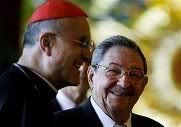 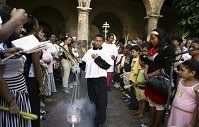 Small but significant steps
Small but significant steps
warm relations between Cuba
and the Roman Catholic Church
By KATHERINE CORCORAN
HAVANA, Mar. 21 (AP) -- Pope Benedict XVI donated the collection from a Holy Thursday Mass to a Cuban orphanage -- a gesture seen here as a sign the Roman Catholic Church wants to be a key moral force in Cuba's future.
On the heels of a historic leadership change and a high-level diplomatic visit from the Vatican, Benedict's nod to Cuba is the latest example of how the church and this communist government have taken small, quiet steps toward healing a once-adversarial relationship.
"It shows that the Pope is in tune with Cuba and understands where it is going ... and that the visit and declarations of (Cardinal Tarcisio) Bertone were more than just diplomacy,'' said Aurelio Alonso, a Cuban academic who studies the church's influence. "It was an important gesture at a very important moment in time.''
While the church needs government permission to expand its social and educational role, the Cuban government sees it as a moral compass amid drifting values and a search for a national identity, church observers say. And good relations with the Church help rehabilitate Cuba's image worldwide.
Discussions between Bertone, the Vatican's secretary of state, and new president Raul Castro last month touched on political prisoners in Cuba and Cubans jailed for spying in the United States. Bertone also publicly reiterated the Vatican's long-held position that the U.S. embargo against Cuba is "ethically unacceptable.''
"In my opinion, the church wants to exercise its role as a mediator'' between Cuba and the outside world, said Enrique Lopez Oliva, a representative in Cuba of the Commission for the Study of the History of the Church in Latin America.
"The issue of prisoners is already on the table. And I have no doubt that the Pope will bring up the issue of Cuba with President Bush in April when he visits Washington.''
Cuban church officials dismissed any political significance in the pope's donation to the Golden Age orphanage in Havana, noting that it's something the Pope does every Holy Week, choosing a different country each time.
But they agreed that the Cuban church's relationship with the government is improving, and that Bertone's visit helped.
"The communication is more fluid,'' said Archbishop Dionisio Garcia in the eastern city of Santiago.
The Church is seeking official status, specifically unlimited access to news media and the reopening of Catholic schools, which were expropriated after the revolution nearly 50 years ago.
[Modificato da TERESA BENEDETTA 21/03/2008 23:14] |
 21/03/2008 21:26 21/03/2008 21:26 |
|
| | | OFFLINE | | Post: 12.504 | Registrato il: 28/08/2005
| Utente Gold | |
|
|
 21/03/2008 22:07 21/03/2008 22:07 |
|
| | | OFFLINE | | Post: 12.506 | Registrato il: 28/08/2005
| Utente Gold | |
|
CELEBRATION OF THE PASSION OF THE LORD - 2
GOOD FRIDAY
 Here are the pictures from Yahoo's newsphoto service. No picture of a 'prostration' either,although it has the part where the Holy Father approaches the Cross barefoot.
Here are the pictures from Yahoo's newsphoto service. No picture of a 'prostration' either,although it has the part where the Holy Father approaches the Cross barefoot.
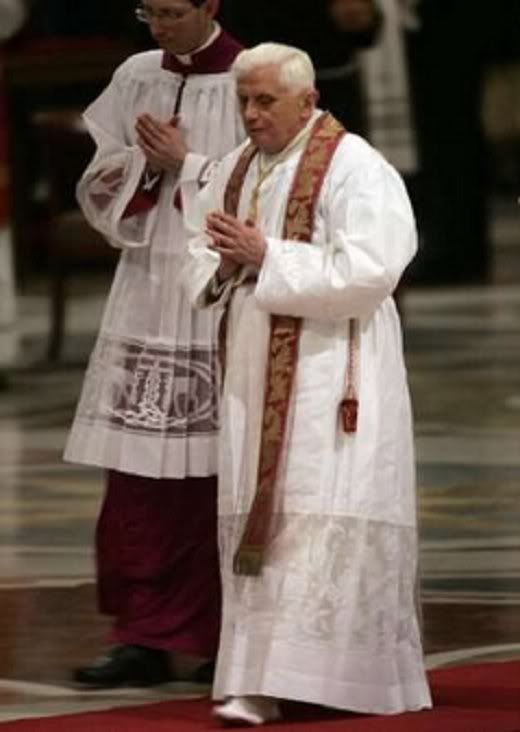
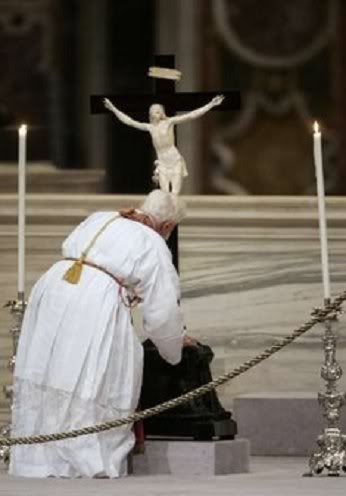 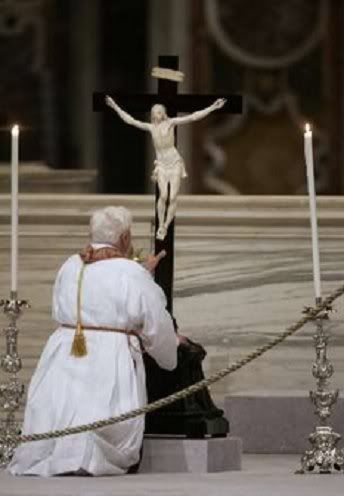
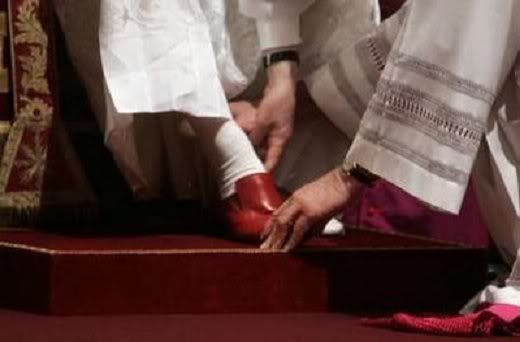
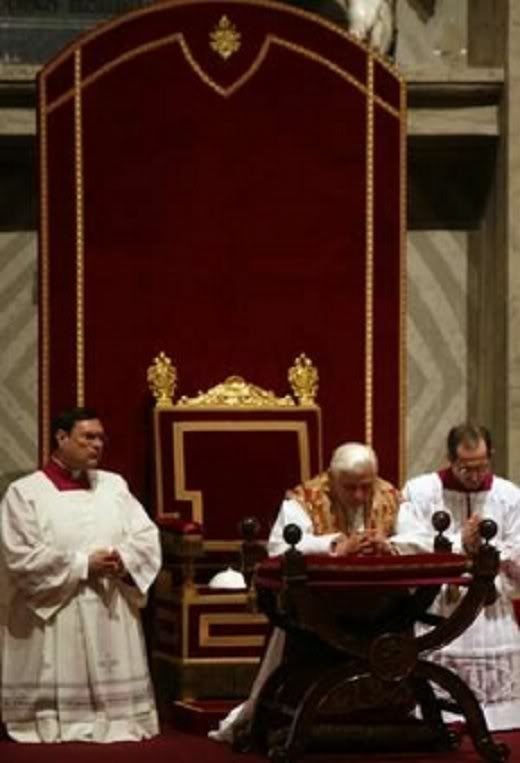
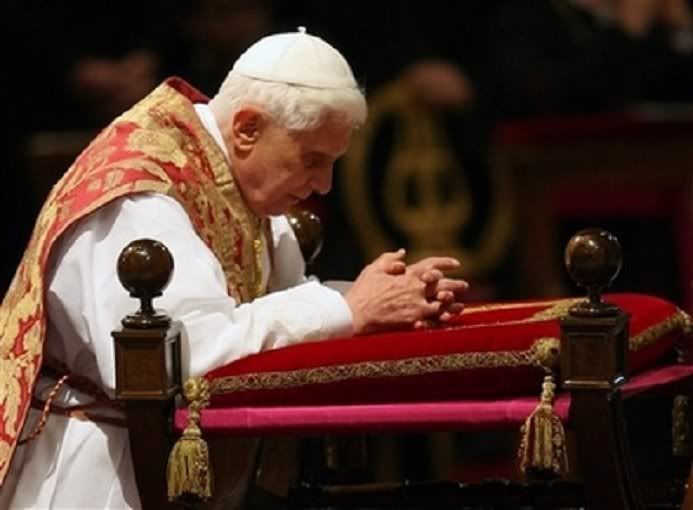
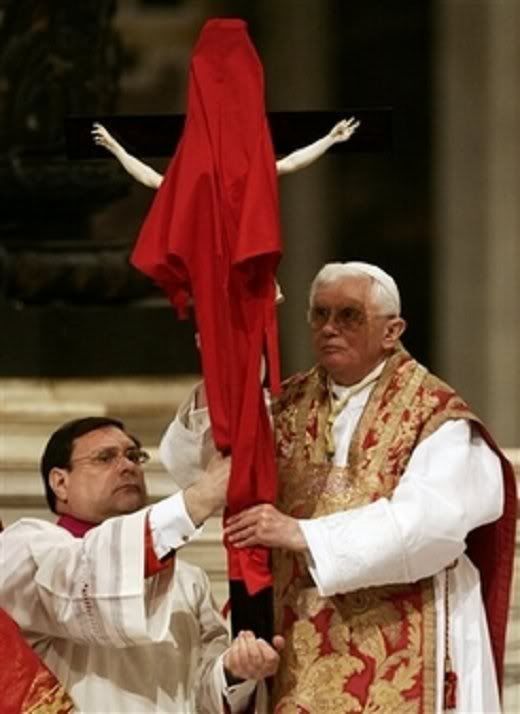
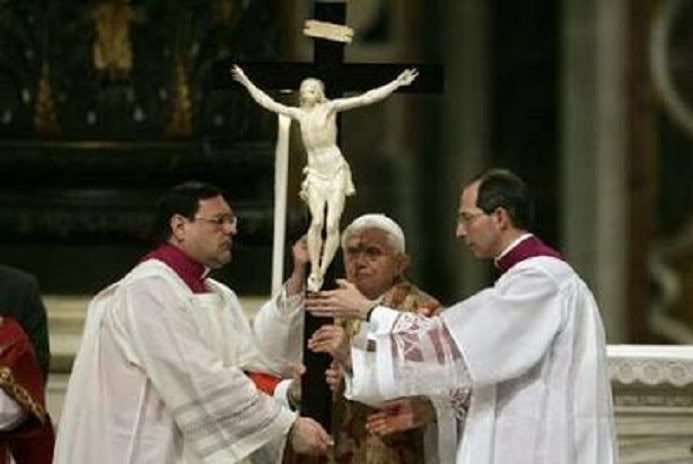
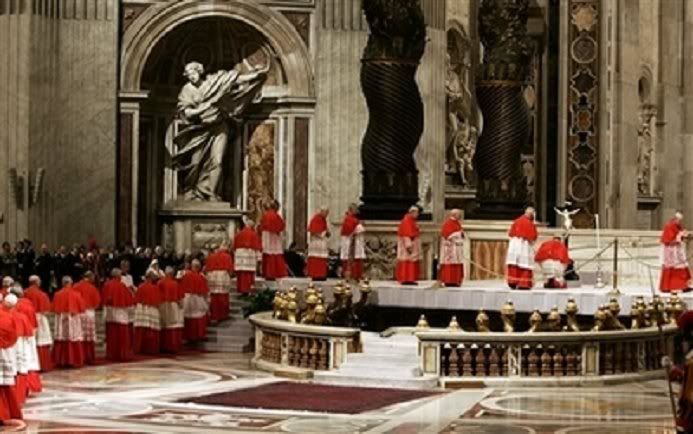 Cardinals line up to adore the Cross.
Cardinals line up to adore the Cross.
|
 21/03/2008 22:12 21/03/2008 22:12 |
|
| | | OFFLINE | | Post: 50 | Registrato il: 26/09/2007
| Utente Junior | |
|
By the time I got to the PC it was 7:20am and they were already at the homily by Fr Cantalamessa so I did not see whether the Holy Father did a prostration. However, later when the Holy Father began the Veneration of the Cross, he was able to genuflect unaided in front of the crucifix, so it made me feel a bit better, also being worried that his health was a bit diminished. He also still is able to "scoot" up and down stairs easily.
I wondered at the color of the roman chasuble - instead of the crimson red I'm used to seeing, it seemed rose-colored ...
A blessed Good Friday heading into the Easter Vigil ...
![[SM=g27823]](https://im0.freeforumzone.it/up/0/23/5787184.gif) ![[SM=g27823]](https://im0.freeforumzone.it/up/0/23/5787184.gif) ![[SM=g27823]](https://im0.freeforumzone.it/up/0/23/5787184.gif) ![[SM=g27823]](https://im0.freeforumzone.it/up/0/23/5787184.gif) |
 21/03/2008 22:23 21/03/2008 22:23 |
|
| | | OFFLINE | | Post: 12.507 | Registrato il: 28/08/2005
| Utente Gold | |
|
VIA CRUCIS AT THE COLOSSEUM
GOOD FRIDAY

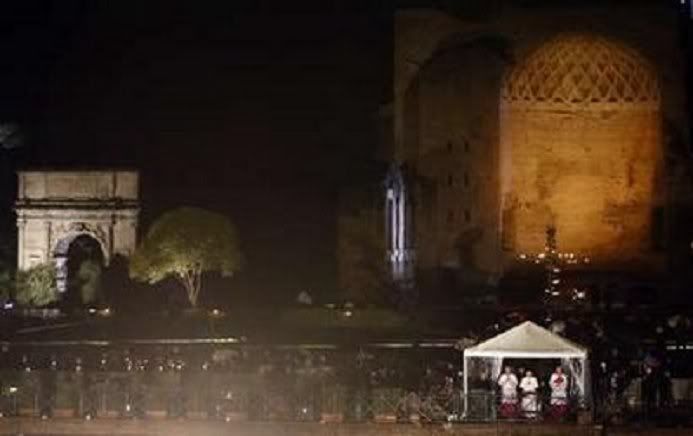
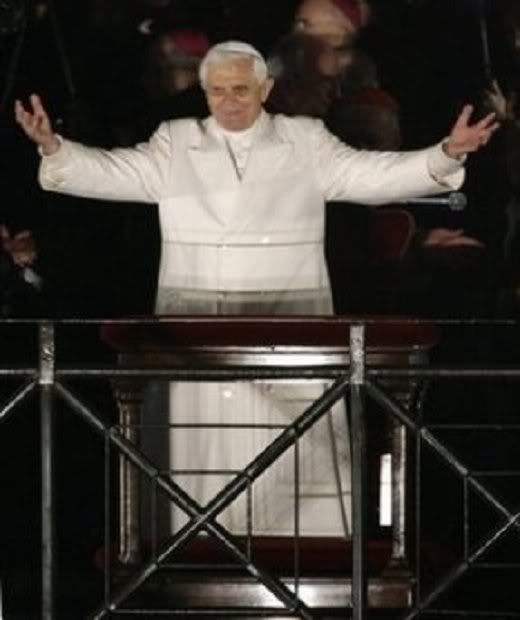 Pope presides at Good Friday procession
Pope presides at Good Friday procession
By FRANCES D'EMILIO
ROME, Mar. 21 (AP) - Pope Benedict XVI presided over the Good Friday nighttime Way of the Cross procession but did not carry the cross as planned during the tradition, which this year paid tribute to Catholics who are persecuted.
The Pope wore a long white coat as he stood sheltered from the cold, pelting rain under a canopy erected on the Palatine Hill overlooking the Colosseum.
At the end of the procession, Italian Cardinal Camillo Ruini handed Benedict the tall, slender, lightweight cross. The Pope gripped the cross briefly.
Then, in a strong voice, he blessed the crowd of thousands being drenched by the rain and buffeted by gusty winds and told them: "Thank you for being patient under the rain. Happy Easter to you."
The Pope was supposed to carry the cross for the final minutes of the more than hour-long procession, taking his turn after a young woman and a young priest from China walked with the symbol of Jesus' crucifixion.
But Vatican officials said that because of the storm, it was decided that the Pope, who turns 81 next month and has two more days of strenuous ceremonies in the days ahead to mark Easter, should stay dry under the canopy.
There was no noticeable increase of security during or before the procession. Earlier in the week, Osama bin Laden accused the Pope of playing a role in a worldwide campaign against Islam, an accusation the Vatican described as baseless.
Last year on Good Friday, Benedict carried the cross briefly at the start and finish of the procession.
"We find ourselves united on this day, at this hour, and in this place, which reminds us about your so many servants who, centuries ago, amid the roars of hungry lions and the shouts of the amused crowd, let themselves be ripped apart and fatally attacked for loyalty to your name," Benedict prayed to God at the start of the procession.
He was referring to systematic martyrdom of many Christians during the first years of church under the Roman Empire.
The Pope lamented that "even today our brothers, in various parts of the world, are still harshly persecuted," and he said the procession was being undertaken in solidarity with persecuted Catholics.
The Pontiff, who has been dedicating much of his papacy to the problems of Catholics in China, asked Hong Kong Cardinal Joseph Zen to compose the meditations which are read aloud during procession.
Zen has said the Vatican made sure there was nothing "dangerous" in the meditations that might offend Beijing. Benedict is eager for the Vatican and China's Communist government to establish diplomatic ties.
In one of the meditations, Zen laments the persecution of Catholics in many parts of the world, but he does not mention China by name.
"Illuminate the conscience of authorities so that they will recognize the innocence of (God's) followers," read one prayer recited during the procession. "Give them the courage to respect religious freedom."
China forced its Roman Catholics to cut ties with the Vatican in 1951, shortly after the Communist Party took power. Worship is allowed only in officially state-sanctioned churches, which recognize the pope as a spiritual leader but appoint their own bishops in defiance of the Vatican.
Millions of Chinese belong to unofficial congregations, and they risk harassment by Chinese authorities. Some clergy have been jailed in China.
Earlier in the day, the Pontiff presided over a long solemn Good Friday service in St. Peter's Basilica.
Late Saturday night, Benedict is scheduled to celebrate Easter vigil Mass in St. Peter's Basilica, and, on Sunday morning, he leads an expected crowd of tens of thousands of faithful in Mass in St. Peter's Square.
From D'Emilio's earlier story:
ROME, March 21 (AP) - Pope Benedict XVI recalled the martyrdom of early Christians thrown to hungry lions in the Colosseum as he presided over the traditional Good Friday Way of the Cross procession at the ancient arena under a driving rain.
The 80-year-old pope wore a long white coat as he stood under a shelter overlooking the procession, which began with Italian Cardinal Camillo Ruini, the pontiff's vicar for Rome, taking the first turn at carrying a slender, plain lightweight cross.
"We find ourselves united on this day, at this hour, and in this place, which reminds us about your so many servants who, centuries ago, amid the roars of hungry lions and the shouts of the amused crowd, let themselves be ripped apart and fatally attacked for loyalty to your name," Benedict prayed to God.
He was referring to systematic martyrdom of many Christians during the first years of church under the Roman empire.
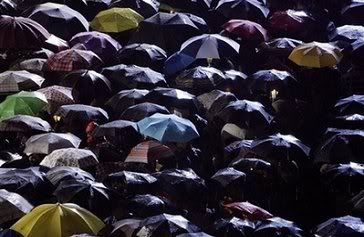 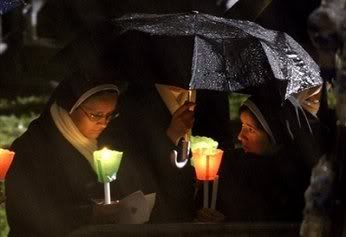
Romans, tourists and pilgrims, bundled up against gusty winds and driving rain, huddled together under umbrellas to read prayer books and keep the flickering flames of candles dry.
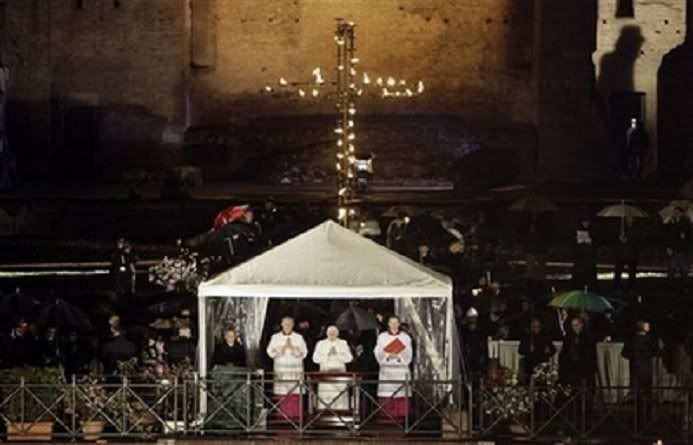
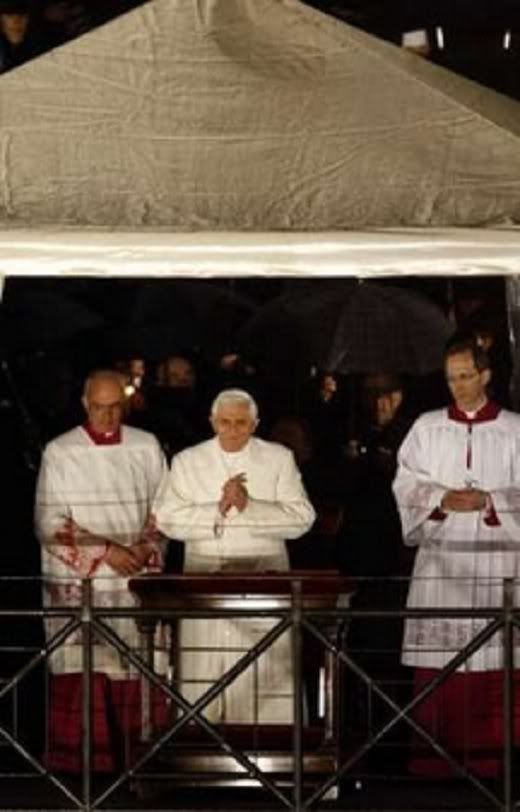 Pope, eyeing China,
Pope, eyeing China,
reflects on persecuted Catholics
By Phil Stewart
ROME, Mar. 21 (Reuters) - Pope Benedict reflected on the persecution of Catholics across the world during a Good Friday procession around Rome's Coliseum that threw the spotlight on suffering among China's faithful.
The Pope, who has made improving relations with China one of the goals of his pontificate, presided over the traditional Via Crucis (Way of the Cross) procession commemorating Christ's crucifixion and death.
Attended by tens of thousands of people, the solemn, night-time ceremony is one of the main services ahead of Easter -- the climax of the Christian year.
Cardinal Joseph Zen Ze-kiun of Hong Kong, who has criticized a lack of religious freedom in China, wrote the meditations for this year. They paid tribute to those "living martyrs" who suffer for their faith.
"In many parts of the world, (the Church) is undergoing the dark hour of persecution," Zen wrote in one of the meditations.
China's 8-12 million Catholics are split between a church approved by the ruling Communist party and an "underground" church wary of government intervention. Beijing and the Vatican severed ties two years after the 1949 Communist takeover.
Even though there was no explicit reference to China's Catholics on Friday, the cardinal said last week his meditations honored China's Catholics, who "are truly a people that have suffered a lot and are suffering."
In the Good Friday ceremony, broadcast on television to 39 countries, a young woman from China carried the cross for the part of the ceremony, under a rainy, cold night sky.
The Pontiff briefly held the cross at the end of the ceremony, facing the ancient ruins of the Coliseum.
Zen noted how the Coliseum was once the place where early Christians were put to the death.
"Coliseums have multiplied down the centuries, wherever our brothers and sisters, in different parts of the world, continue to be harshly persecuted today," Zen wrote in the foreword, which the Pope read aloud.
Earlier this month, an Iraqi archbishop was found dead in eastern Mosul after being kidnapped by gunmen, in an attack Iraqi Prime Minister Nuri al-Maliki blamed on al Qaeda.
The Pontiff is proceeding with a busy calendar of Easter weekend celebrations despite fresh accusations from al Qaeda leader Osama bin Laden.
The Saudi-born militant leader said in an audio recording released this week that the publication of cartoons mocking the Prophet Mohammad was part of a "new crusade" involving Pope Benedict -- a charge the Vatican denied.
Italian security officials said on Friday the message was being treated as a threat against the Pope, but added no changes were needed to the Pontiff's already tight security.
The German-born Pope is leading the 1.1 billion-member Roman Catholic Church towards the third Easter of his pontificate.
On Saturday night, Benedict will say an Easter Eve mass, and on Sunday will deliver an "Urbi et Orbi" (to the city and the world) blessing and message.
Pope Benedict XVI presides
over Good Friday Via Crucis
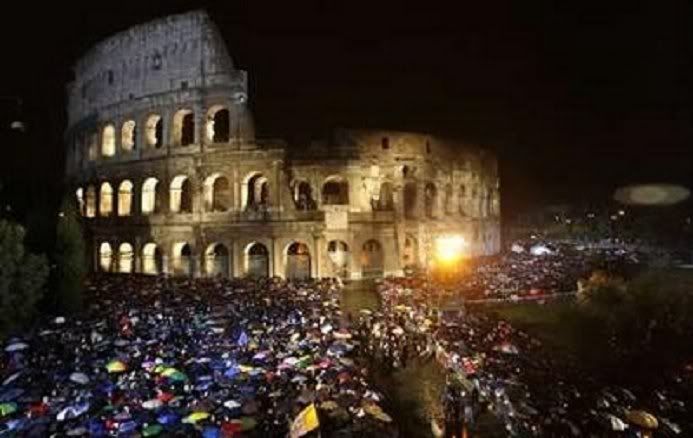
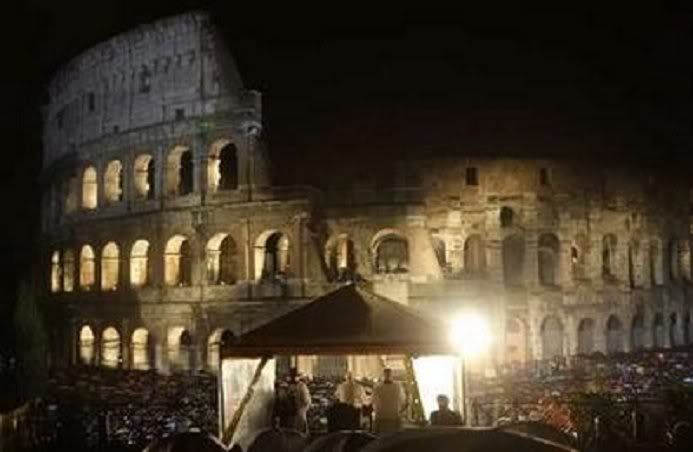
Rome, Mar. 21 (dpa) - Pope Benedict XVI presided over Rome's traditional Good Friday Via Crucis (Way of the Cross) kneeling under a gazebo as the procession, which commemorates Jesus' path to crucifixion, wound round the Coliseum on a cold, wet evening.
Benedict used his opening prayer to highlight ongoing persecution around the world, making reference to the tradition in Ancient Roman times where Christians were fed to lions in the Coliseum.
"Over the ages we have witnessed the multiplying of Coliseums, there where our brothers in various parts of the world, in continuation with Your (Christ's) Passion are even today being harshly persecuted," said Benedict.
The Pontiff then knelt down and from the Palatine Hill overlooking the Roman amphitheatre looked on as the Vicar of Rome, Cardinal Camillo Ruini, took up the wooden cross symbolizing Christ's death and led the first of the 14 Stations of the Cross.
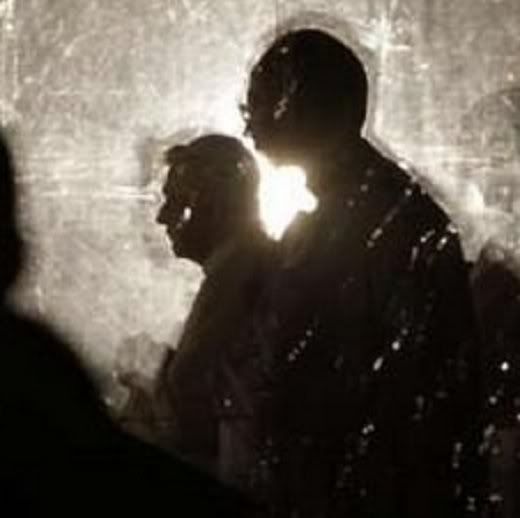
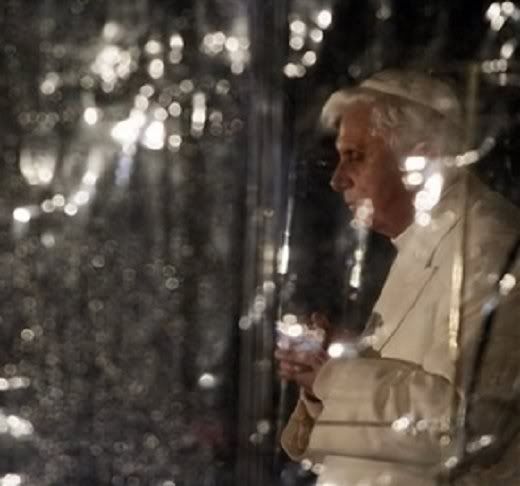
During the candle-lit procession, the cross was passed on from person to person, including a Roman Catholic nun from Burkina Faso, a family from Rome, a disabled woman in a wheelchair and several Franciscan friars from a monastery based in the Holy Land.
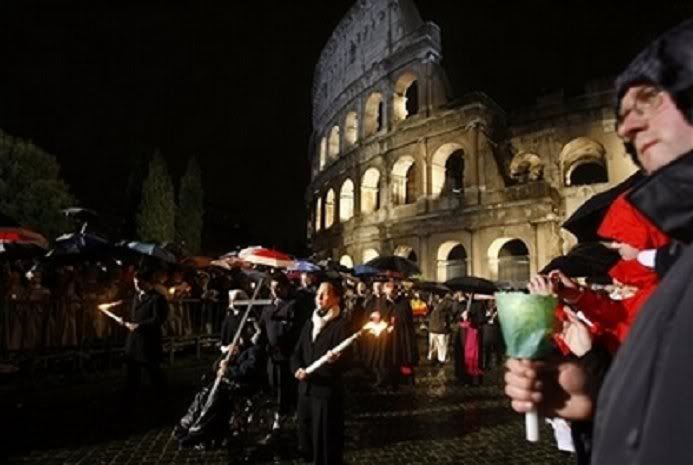
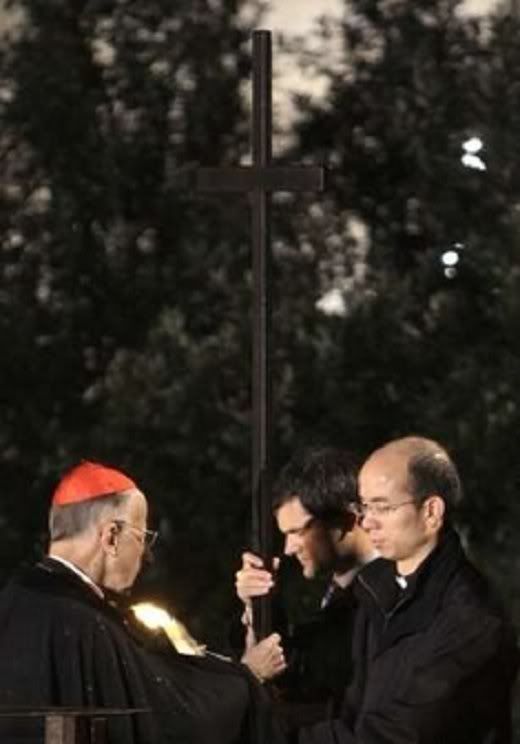
At each of the 14 intervals the faithful, many huddling under umbrellas, recited prayers, while meditations prepared by the Archbishop of Hong Kong, Cardinal Joseph Zen Ze-Kiun, were also read out.
Benedict, according to the Vatican's programme for the ceremony, was to join the procession at the 12th Station and carry the cross for the remaining stages.
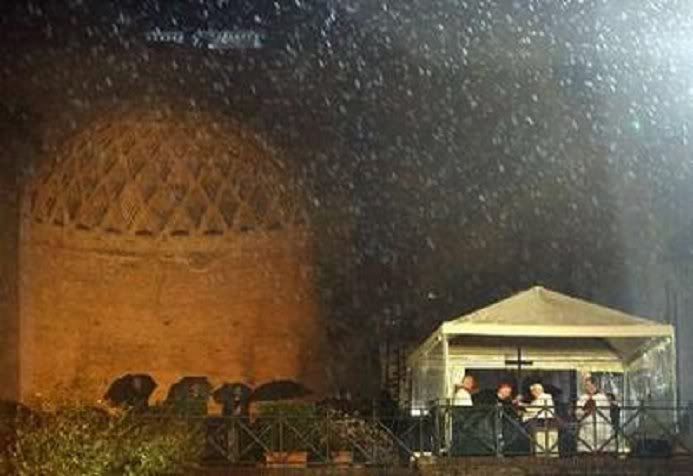
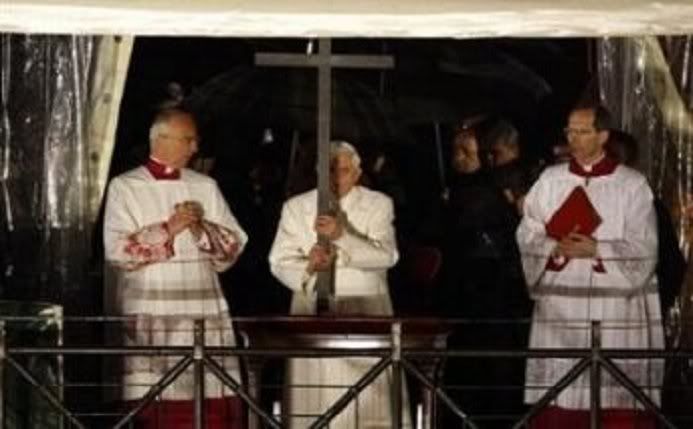
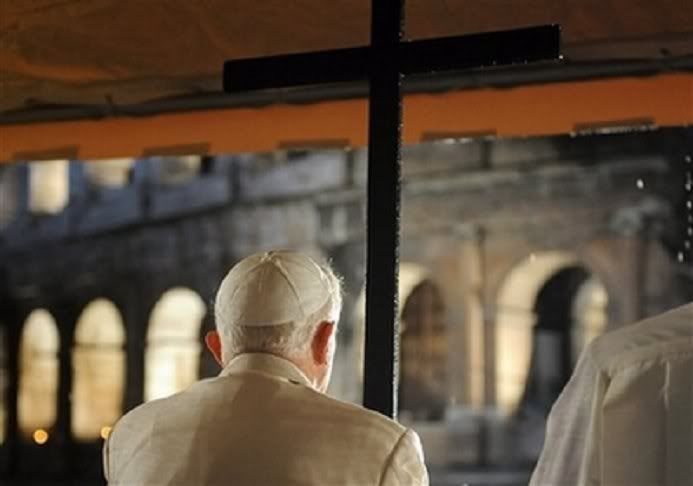
Instead he only held the Cross - which was handed to him on the Palatine Hill by a Chinese woman - at the final, 14th Station: Jesus is laid in the tomb.
The Rome ceremony - similar commemorations took place Friday in Jerusalem and scores of countries around the world - was Benedict's third since his 2005 election as Pope.
In the previous two he walked in the entire procession. Ahead of this year's ceremony, the Vatican said the 80-year-old Pontiff's participation had been scaled down to allow him to "marshal his strength" for an intense Easter Holy Week schedule.
In keeping with the Chinese overtones at this year's Via Crucis in Rome, many of the thousands who attended clutched copies of the Vatican's official brochure for the ceremony which depicted Christ's Passion through a series of Chinese paintings and engravings.
The programme for the Via Crucis including Cardinal Zen's contributions was compiled before the recent violence in Tibet, but Friday's ceremony took place in the backdrop of an uneasy exchange between the Vatican and Beijing on the situation in the Chinese-ruled Himalayan region.
Earlier in the week Benedict urged an end to violence in Tibet and called on Beijing and the mostly Buddhist pro-independence demonstrators to engage in dialogue. In response, China said no tolerance would be shown to "criminals."
Cardinal Zen, known for his outspokenness on religious freedom in China - where Catholics are divided between those who follow the Beijing-sanctioned church and those who remain loyal to the Pope - was not in Rome for the Via Crucis but stayed in Hong Kong to commemorate the event "with his flock," the Vatican said.
Zen in the Vatican's brochure for the Via Crucis wrote that the Pope had invited him to pen the meditations "to manifest his (Benedict's) attention for the Great Asiatic continent, in particular the mercy of the Christian faithful in China."
"The Pope wanted me to bring to the Coliseum the voice of those (Chinese) sisters and brothers who are so far away," Zen wrote.
The Vatican's Holy Week celebrations culminate on Easter Sunday with the pope's traditional Urbi et Orbi blessing and message "to the city and the world."
[Modificato da TERESA BENEDETTA 22/03/2008 19:11] |
 22/03/2008 00:30 22/03/2008 00:30 |
|
| | | OFFLINE | | Post: 12.509 | Registrato il: 28/08/2005
| Utente Gold | |
|
VIA CRUCIS AT THE COLOSSEUM
GOOD FRIDAY

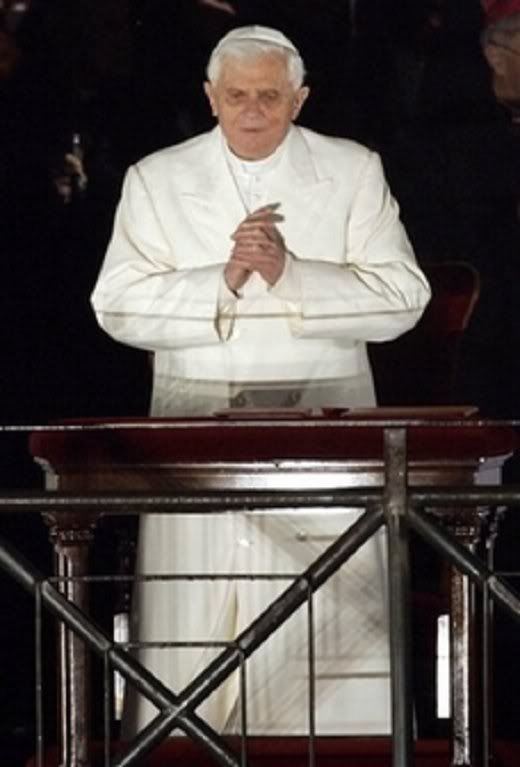 Here is a translation of the Holy Father's words at the end of the Via Crucis Friday night:
Here is a translation of the Holy Father's words at the end of the Via Crucis Friday night:
Dear brothers and sisters,
This year once again, we have followed the way of the Cross, the Via Crucis, evoking with faith the stages of the Passion of Christ. Our eyes have seen again the suffering and anguish that our Redeemer had to bear in his hour of great pain at the culmination of his mission on earth.
Jesus has died on the Cross and lies in the sepulchre. Good Friday, so impregnsted with human sadness and religious silence, ends in the silence of meditation and prayer.
Going back to our homes tonight, we too, like those who were present at the sacrifice of Jesus, can only 'beat our breasts', thinking back on all that has happened (cf Lk 23,48). Could anyone be indifferent to the death of a God? For us, for our salvation, he became man and died on the Cross.
Brothers and sisters, today we turn our attention, so often distracted by scattered and ephemeral world lyinterests, towards Christ: let us pause and contemplate his Cross.
The Cross is the spring of univsal life, it is a school for justice and peace, it is a universal patrimony of forgiveness and mercy. It is the permanent proof of an oblative and infinite love which impelled God to become a vulnerable man like each of us, up to his death on the Cross.
His arms nailed to the Cross are open for every human being, inviting us to come close to him, certain that he welcomes us and holds us to him in an embrace of infinite kindness: "When I am lifted up from the earth," he said, "I will draw everyone to myself" Jn 12,32).
Through the sorrowful way of the Cross, men in every age, reconciled and redeemed by the Blood of Christ, have become friends of God, children of the heavenly Father. "Friend!", Jesus called Judas as he addressed him with his last dramatic appeal for penitence. He calls each of us 'friend' because he is the true friend of all.
Unfortunately, men have not always succeeded in perceiving the profoundness of this boundless love that God has for his creatures. To him, race and culture make no difference. Jesus Christ died to free man from ignorance of God, from the cycle of hatred and vengeance, from the slavery of sin. The Cross makes us all brothers.
We may well ask ourselves: What have we done with this gift? What have we done with God's revelation of himself in Christ, of the revelation of God's love which conquers hate?
So many, even in our time, do not know God and cannot find him in the crucified Christ. So many are in search of love and freedom that exclude God. So many believe they do not need God.
Dear friends, after having lived together the Passion of Jesus, let us allow his sacrifice on the Cross to speak to us and question us: let us allow him to place our human certainties in crisis. Let us open our hearts to him: Jesus is the Truth which makes us free to love.
Let us not be afraid! In dying, our Lord has saved sinners, that is, all of us.
The Apostle Peter wrote: "He himself bore our sins in his body upon the cross, so that, free from sin, we might live for righteousness. By his wounds you have been healed" (1 Pt 2,24).
This is the truth of Good Friday: On the Cross, the Redeemer returned to us the dignity that is ours. He made us adoptive children of God who created us in his image and likeness.
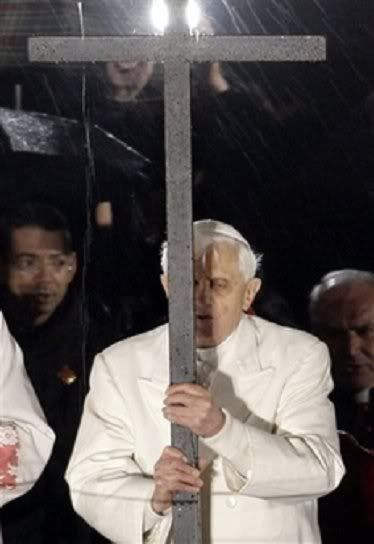 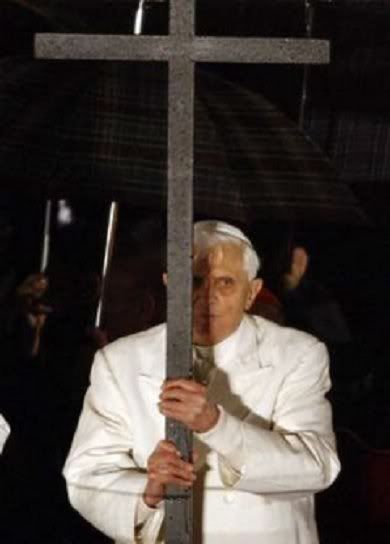
O Christ, crucified King, give us true knowledge of yourself, the joy that we yearn for, the love which can fill our hearts that thirst for the infinite. Thus we pray to you tonight, Jesus, Son of God, who died for us on the Cross and rose again on the third day. Amen.
[Modificato da TERESA BENEDETTA 22/03/2008 19:10] |
 22/03/2008 17:07 22/03/2008 17:07 |
|
| | | OFFLINE | | Post: 12.519 | Registrato il: 28/08/2005
| Utente Gold | |
|
    Vatican PR ensures
Vatican PR ensures
rebranded Pope Benedict XVI
will triumph in US
By Richard Owen in Rome

March 22, 2008
Richard Owen is capable of poisoning everything he ever writes about the Pope. While this one is more well-meaning than Owen usually is, he's also talking about the Pope as though he were one of those hapless TV subjects for 'make-overs' or a soda to be sold under a new brand. And he has to do it on Good Friday.
As plain Joseph Ratzinger he was the Pope's ruthless doctrinal enforcer, described in hushed tones in the Vatican's corridors of power as “God's rottweiler” and “the Panzerkardinal”.
As Pope Benedict XVI he has earned the affection of millions of Catholics with a crowd-pleasing style. [Gee, thanks for acknowledging that!]
It is an extraordinary transformation for a German cardinal who was considered a dogmatic and inflexible hardliner but who can now expect the warmest of welcomes when he makes his first visit to the United States.
Mary Ann Glendon, the new US Ambassador to the Holy See, said that America would find in the Pope a man who had made “a smooth transition from scholar to universal pastor”.
She said: “He does not dumb down, and I think that's his particular gift, that he is able to communicate very profound and complex ideas in accessible language.”
The papal makeover owes much to his team of aides. His backroom staff includes Giovanni Maria Vian, the first new editor of L'Osservatore Romano, the Vatican newspaper, for 23 years. Vian was brought in last October to make the paper livelier, up to date, more “global” — and available online. He has opened it up to Protestant and Jewish writers, and has hired its first Muslim journalist.
Vian is part of a new team of progressive papal aides that also includes Mgr Gianfranco Ravasi, the new head of the Pontifical Council for Culture. The key hidden hand, however, is that of Archbishop Claudio Maria Celli, since last June head of the Vatican's Department of Social Communications, which oversees its television and media operations.
Mgr Celli, whose amiable face hides one of the sharpest minds in the Vatican, seized at once on the dangers of the Church being seen as “fundamentalist”. He has at his side an equally sharp-minded Irish priest, Mgr Paul Tighe, brought in as No 2 from Dublin, where he handled PR for the archdiocese.
Their aim, Mgr Tighe says, is to “harness the potential of the media as a means of evangelisation”. Archbishop Celli says that many people in the world have a “deep nostalgia for God” that the Church can meet by being more open and embracing the internet and satellite television.
There has also been a stream of surprising papal initiatives. The Vatican is to host a debate on Darwinism, evolution and intelligent design this year.
Pope Benedict has also made overtures to the Muslim world, convening a Catholic-Muslim forum that will hold its first summit in the Vatican in November.
The Pope's basic hardline message, nevertheless, remains the need to defend and project the “core values” of Catholicism. During his US visit he has asked to meet Catholic education officials to remind them that they must clamp down on “unorthodox” campus meetings favouring abortion, “planned parenthood” or embryonic stem-cell research.
But according to Cardinal Edward Egan, the Archbishop of New York, the Pope that both America and the world will see is the Pontiff who has produced two thoughtful and compassionate encyclicals, on love and on hope, and is about to issue a third, on social problems in an age of globalisation.
Benedict will hold the first ever papal Mass at St Patrick's Cathedral and another at Yankee Stadium, as well as visiting Ground Zero, addressing the UN and meeting President Bush.
=====================================================================
John Allen's column this week is what he calls a 'one-stop' guide to the coming Papal visit to the US. I posted it straight into the APOSTOLIC VOYAGE ... thread, because it is quite lengthy and it would have 'distracted' too much from the Good Friday stories on this thread. Owen's story came after the main Good Friday events.
|
 23/03/2008 03:45 23/03/2008 03:45 |
|
| | | OFFLINE | | Post: 12.524 | Registrato il: 28/08/2005
| Utente Gold | |
|
EASTER VIGIL MASS
GOOD SATURDAY - EASTER VIGIL

 Watching the Easter Vigil Mass tonight, I was afraid that the Anglphone media would choose to play up
Watching the Easter Vigil Mass tonight, I was afraid that the Anglphone media would choose to play up
Magdi Allam's baptism - and they have.
Pope baptizes prominent Italian Muslim
By NICOLE WINFIELD
VATICAN CITY, Mar 23 (AP) - Italy's most prominent Muslim, an iconoclastic writer who condemned Islamic extremism and defended Israel, converted to Catholicism Saturday in a baptism by the pope at a Vatican Easter service.
An Egyptian-born, non-practicing Muslim who is married to a Catholic, Magdi Allam infuriated some Muslims with his books and columns in the newspaper Corriere della Sera newspaper, where he is a deputy editor. He titled one book Long Live Israel.
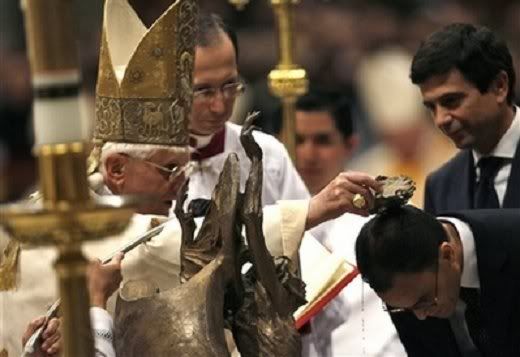 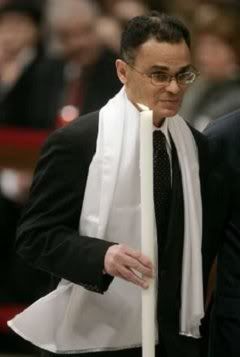
As a choir sang, Pope Benedict XVI poured holy water over Allam's head and said a brief prayer in Latin.
"We no longer stand alongside or in opposition to one another," Benedict said in a homily reflecting on the meaning of baptism. "Thus faith is a force for peace and reconciliation in the world: distances between people are overcome, in the Lord we have become close."
Vatican Television zoomed in on Allam, who sat in the front row of the basilica along with six other candidates for baptism. He later received his first Communion.
Allam, 55, told the newspaper Il Giornale in a December interview that his criticism of Palestinian suicide bombing provoked threats on his life in 2003, prompting the Italian government to provide him with a sizable security detail.
The Union of Islamic Communities in Italy — which Allam has frequently criticized as having links to Hamas — said the baptism was his own decision.
"He is an adult, free to make his personal choice," the Apcom news agency quoted the group's spokesman, Issedin El Zir, as saying.
Yahya Pallavicini, vice president of Coreis, the Islamic religious community in Italy, said he respected Allam's choice but said he was "perplexed" by the symbolic and high-profile way in which he chose to convert.
"If Allam truly was compelled by a strong spiritual inspiration, perhaps it would have been better to do it delicately, maybe with a priest from Viterbo where he lives," the ANSA news agency quoted Pallavicini as saying.
The nighttime Easter vigil service at St. Peter's Basilica marked the period between Good Friday, which commemorates Jesus' crucifixion, and Easter Sunday, which marks his resurrection.
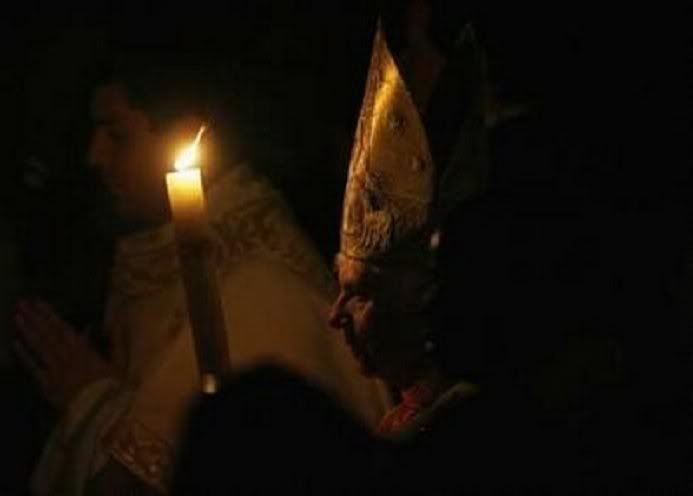
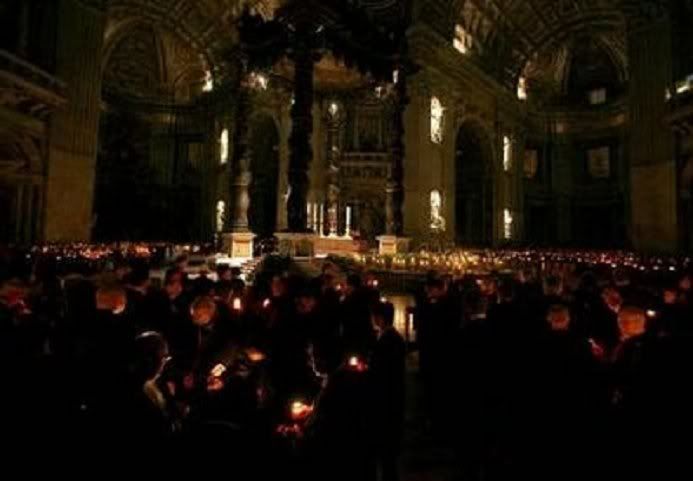
Benedict opened by blessing a white candle, which he then carried down the main aisle of the darkened basilica. Slowly, the pews began to light up as his flame was shared with candles carried by the faithful, until the whole basilica twinkled and the main lights came on.
The pope administers baptism "without making any 'difference of people,' that is, considering all equally important before the love of God and welcoming all in the community of the Church," said the Vatican spokesman, the Rev. Federico Lombardi.
Allam, who has a young son with his Catholic wife and two adult children from a previous relationship, indicated in the Il Giornale interview that he would have no problem converting to Christianity. He said he had even received Communion once — when he was 13 or 14 — "even though I knew it was an act of blasphemy, not having been baptized."
He did not speak to the press Saturday and his newspaper said it had no information about his conversion.
Allam said in the interview that he had made a pilgrimage to Mecca, as is required of all Muslims, with his deeply religious mother in 1991, although he was not otherwise observant.
"I was never practicing," he was quoted as saying. "I never prayed five times a day, facing Mecca. I never fasted during Ramadan."
Allam also explained his decision to title a recent book Viva Israele by saying he wrote it after he received death threats from Hamas.
"Having been condemned to death, I have reflected a long time on the value of life. And I discovered that behind the origin of the ideology of hatred, violence and death is the discrimination against Israel. Everyone has the right to exist except for the Jewish state and its inhabitants," he said. "Today, Israel is the paradigm of the right to life."
In 2006, Allam was a co-winner, with three other journalists, of the $1 million Dan David prize, named for an Israeli entrepreneur. Allam was cited for "his ceaseless work in fostering understanding and tolerance between cultures."
There is no overarching Muslim law on conversion. But under a widespread interpretation of Islamic legal doctrine, converting from Islam is apostasy and punishable by death — though killings are rare.
Egypt's highest Islamic cleric, the Grand Mufti Ali Gomaa, wrote last year against the killing of apostates, saying there is no worldly retribution for Muslims who abandon their religion and that punishment would come in the afterlife.
On Wednesday, a new audio message from Osama bin Laden accused the pope of playing a "large and lengthy role" in a "new Crusade" against Islam that included the publication of drawings of the Prophet Muhammad that many Muslims found insulting.
Lombardi said Thursday that Bin Laden's accusation was baseless. He said Benedict repeatedly criticized the Muhammad cartoons, first published in some European newspapers in 2006 and republished by Danish papers in February.
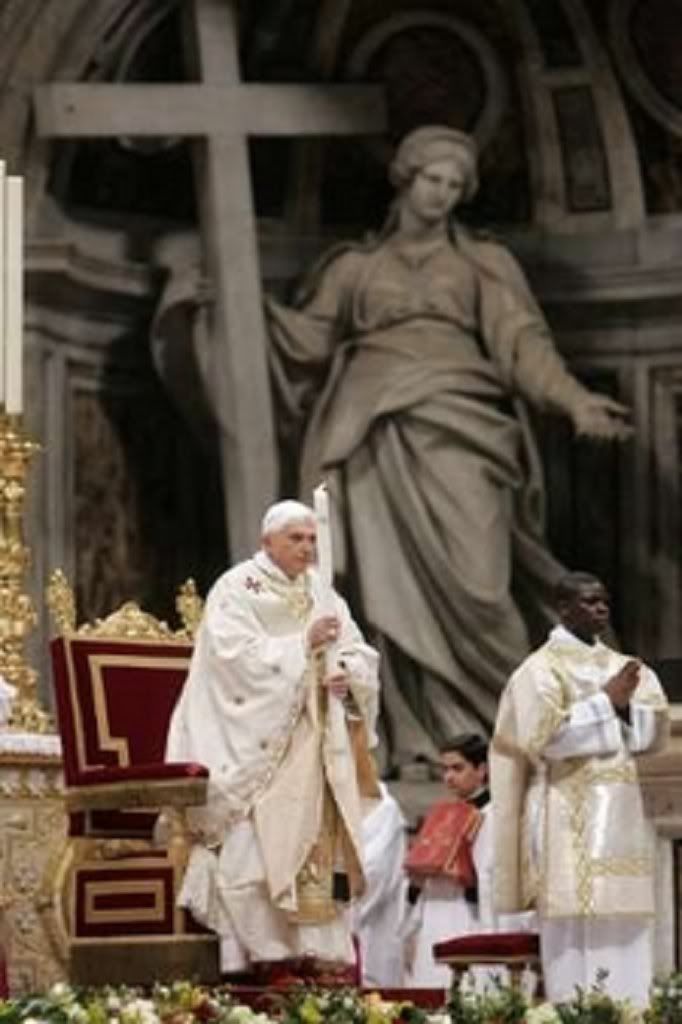
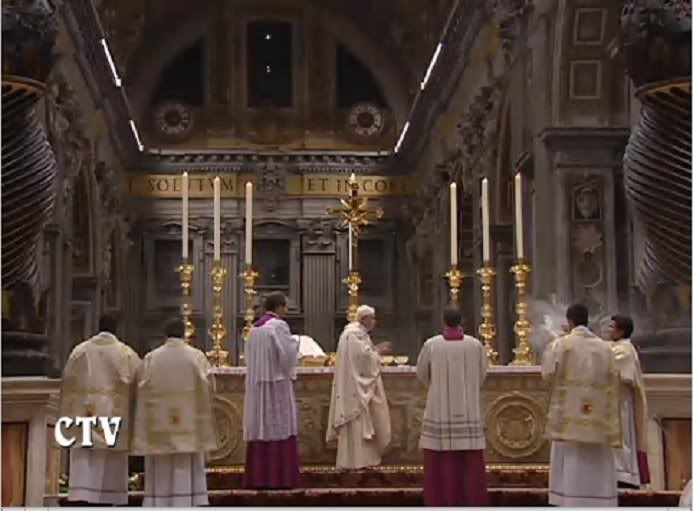 Pope baptises former Muslim
Pope baptises former Muslim
during Easter vigil
VATICAN CITY, Mar. 22 (AFP) - Pope Benedict XVI on Saturday baptised a former Muslim among seven converts to Roman Catholicism during an Easter vigil mass at St Peter's Basilica.
Magdi Allam, a 55-year-old Italian journalist of Egyptian origin, is an editorial writer and deputy publisher of the Corriere della Sera newspaper.
He was long described as a moderate Muslim before he decided to convert to Catholicism.
"People who are baptised and believers are never strangers to each other," the pope said in his homily. "Continents, cultures, social structures and historical distances cannot separate us.
"But we meet each other, we know each other by the same Lord, the same faith, the same hope, and the same love that shapes us."
Allam, who has been outspoken about the conflict in the Middle East, in 2006 organised a demonstration in Rome in support of Christians in the Muslim world.
Benedict also baptised a Chinese woman in the Easter vigil.
Saturday night's observance symbolises the passage of Jesus Christ from death to resurrection and is traditionally marked by adult baptisms.
"To the Catholic Church, anyone has the right to be baptised who is making a fully free choice after a deep personal quest and adequate preparation," Vatican spokesman Federico Lombardi said in a statement.
In its relations with Islam and other religions the Vatican has stressed both freedom of religion and the right to convert to another faith.
The two men and five women baptised Saturday are from Italy, Cameroon, China, the United States and Peru.
About 30 cardinals celebrated the mass with Benedict, who seemed fatigued on the third day since Easter celebrations began in earnest on Holy Thursday.
Friday night, the Pope opted out of carrying a cross symbolising the crucifixion of Jesus Christ to conclude the traditional Good Friday procession at Rome's Colosseum.
The 80-year-old Pope had earlier planned to take part in only the final three of the Fourteen Stations of the Cross commemorating the path Jesus took to his execution in one of Christendom's most solemn observances.
The theme of religious freedom was at the heart of that observance, marked by meditations penned by outspoken Hong Kong Cardinal Joseph Zen, a key figure for Asian Catholics including those in China who are split between the official and clandestine Catholic churches.
On Sunday, Benedict is to celebrate an open-air Easter mass in St Peter's Square, followed by his traditional "urbi et orbi" (to the city and the world) blessing to be broadcast live in 57 countries.
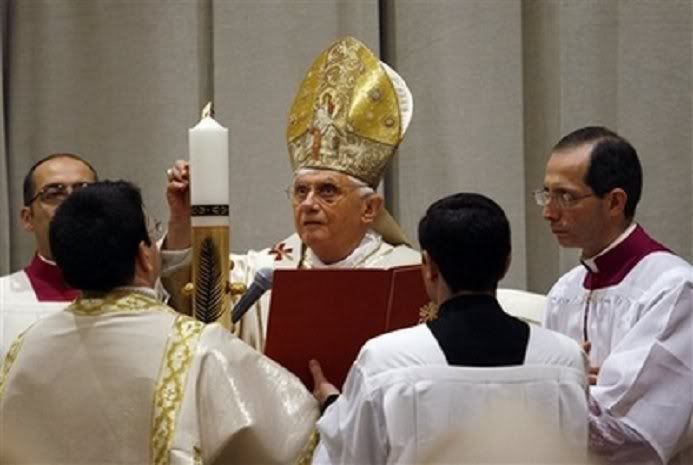
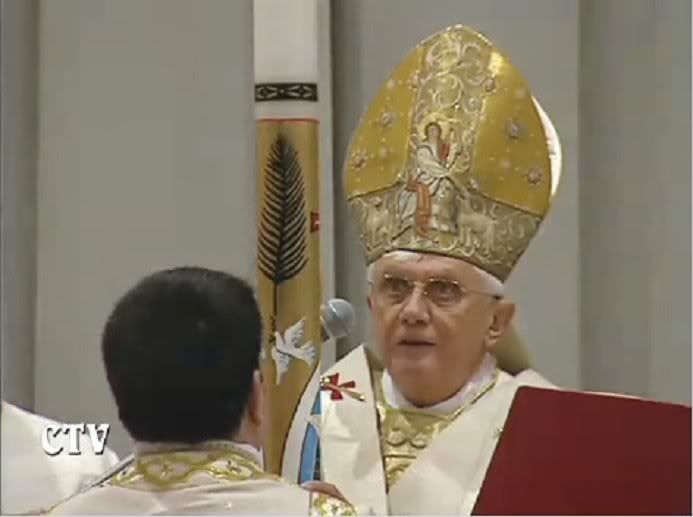
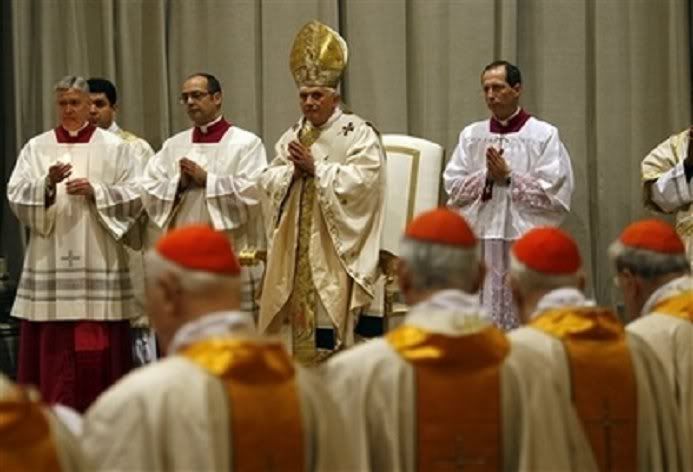
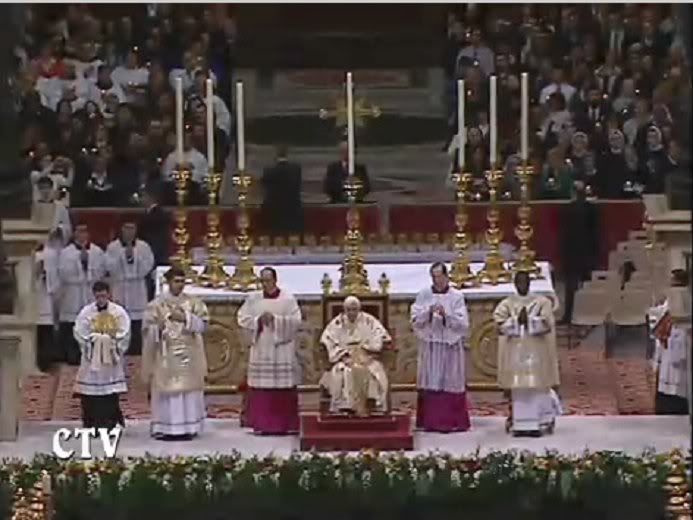
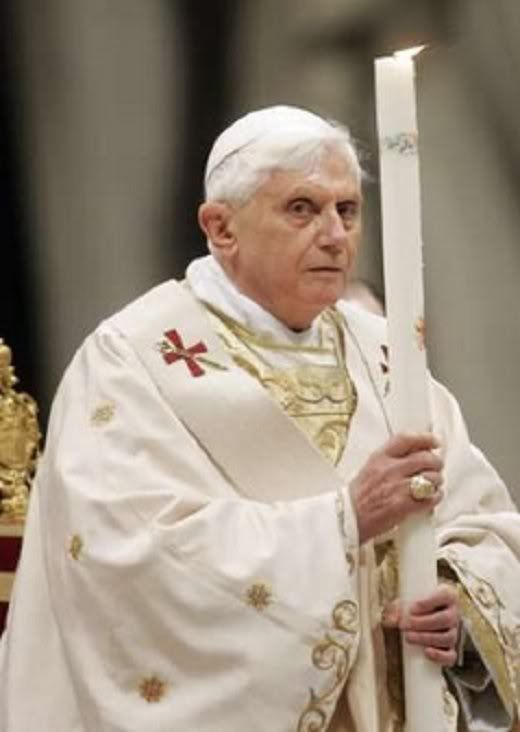
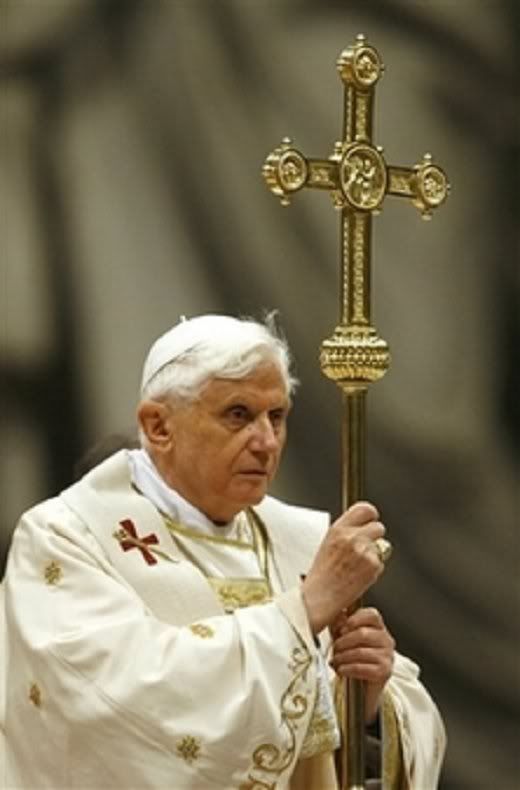 Pope baptizes famous Muslim convert
Pope baptizes famous Muslim convert
By Philip Pullella
VATICAN CITY, Mar. 23 (Reuters) - Pope Benedict led the world's Catholics into Easter on Saturday at a Vatican service where he baptized a Muslim-born convert who is one of Italy's most famous and controversial journalists.
The German-born Pontiff, marking the third Easter season of his pontificate, began the service in the atrium of a darkened St Peter's Basilica where he carved the Greek letters Alpha and Omega on a large candle.
The basilica became a sea of flickering flames as thousands of faithful inside lit candles before the lights were turned on in a ritual symbolizing the darkness in the world after Christ's death and the light of the resurrection.
Easter, the most important day in the Church's liturgical calendar, commemorates Christ rising from the dead three days after he was crucified.
In his sermon, Benedict wove a connection between the resurrection of Christ and the sacrament of baptism, the initiation rite of Christianity.
"...from the abyss of death he was able to rise to life. Now he raises us from death to true life. This is exactly what happens in baptism," the pope said.
The Pope traditionally baptizes newborns on January 1 and adult converts to Catholicism on Easter eve.
One of the seven adults he baptized on Saturday night was Magdi Allam, 55, an Egyptian-born journalist who, as deputy director of the leading newspaper Corriere della Sera, is one of Italy's best-known intellectuals.
Allam, a fierce critic of Islamic extremism and a strong supporter of Israel, is protected by a police escort because of threats he has received.
His conversion to Christianity was a well-kept secret, disclosed by the Vatican in a statement less than an hour before the Easter eve service started.
"For the Catholic Church, each person who asks to receive baptism after a deep personal search, a fully free choice and adequate preparation, has a right to receive it," it said.
Allam defended the Pope in 2006 when the pontiff made a speech in Regensburg, Germany, that many Muslims perceived as depicting Islam as a violent faith.
The Vatican statement announcing Allam was joining Catholicism said all newcomers were "equally important before God's love and welcome in the community of the Church."
Allam, who has been living in Italy for 35 years, has said he was never a very devout Muslim. Still, his conversion to Christianity came as a surprise.
"What amazes me is the high profile the Vatican has given this conversion," Yaha Sergio Yahe Pallavicini, vice-president of the Italian Islamic Religious Community, told Reuters.
The Easter eve service was the first of three at which the Pope presides. On Sunday he will celebrate a mass and then deliver his twice-yearly "Urbi et Orbi" (to the city and the world) blessing and message.
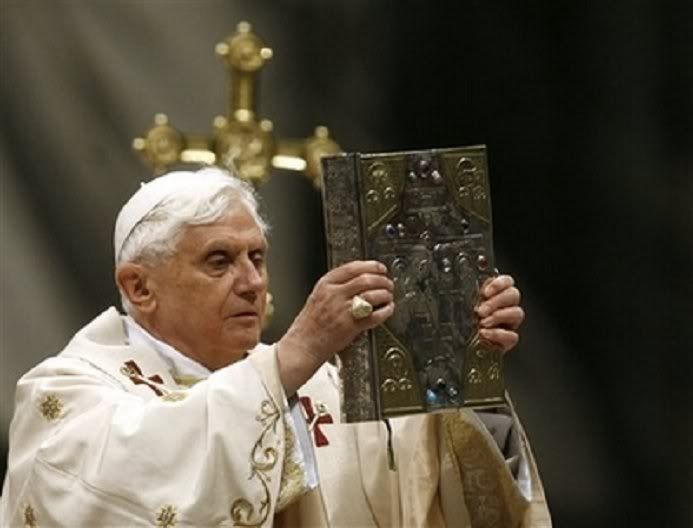
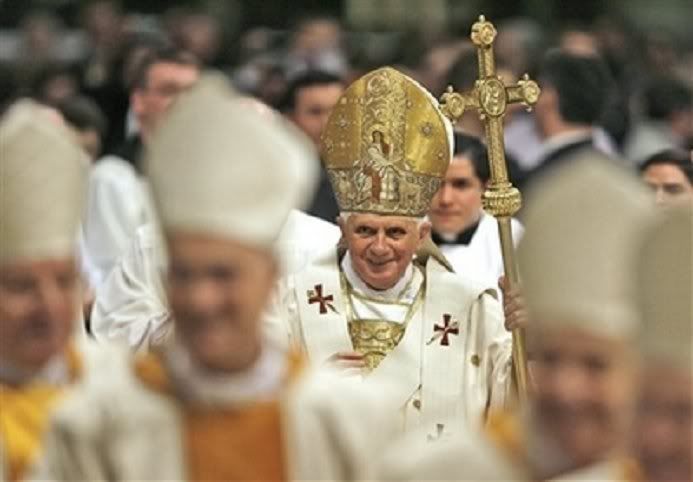
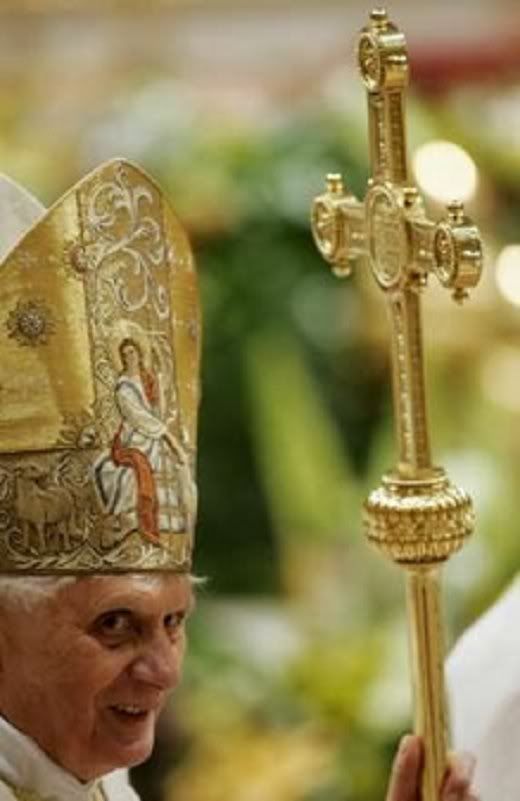
[Modificato da TERESA BENEDETTA 23/03/2008 13:53] |
 23/03/2008 17:32 23/03/2008 17:32 |
|
| | | OFFLINE | | Post: 12.528 | Registrato il: 28/08/2005
| Utente Gold | |
|
EASTER AT THE VATICAN

 
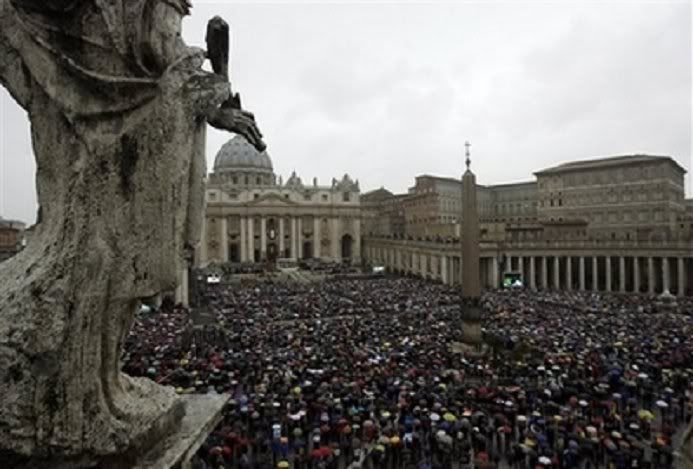
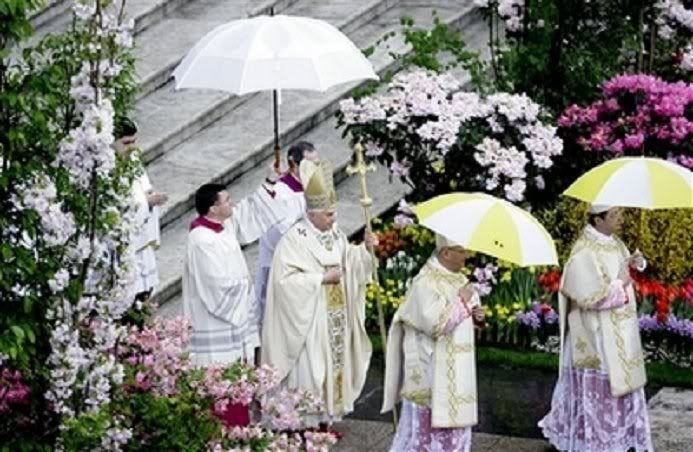
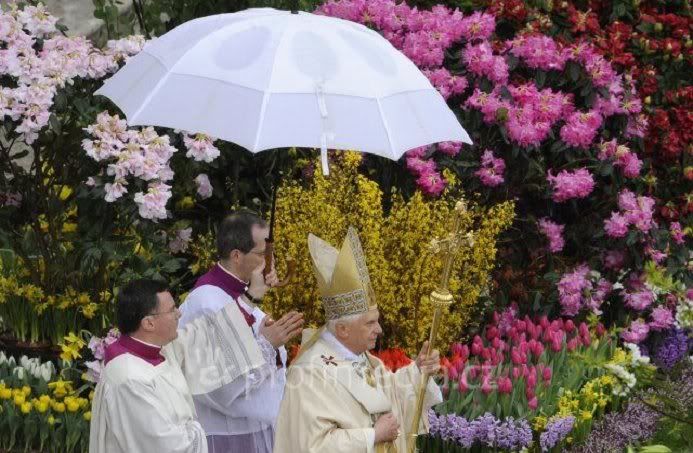 Pilgrims brave rain for
Pilgrims brave rain for
Easter Mass with Pope
by Gina Doggett
VATICAN CITY, Mar. 23 (AFP) - Pope Benedict XVI on Sunday celebrated Easter mass before tens of thousands of pilgrims huddled under a sea of umbrellas in St Peter's Square on the holiest day of the Christian calendar.
Rain pelted the flower-bedecked square throughout the mass celebrating the Resurrection of Christ after his crucifixion on Good Friday.
The 80-year-old leader of the world's 1.1 billion Catholics chose the white and gold vestments and gold mitre of Benedict XV, his namesake who reigned from 1914 to 1922, for the occasion.
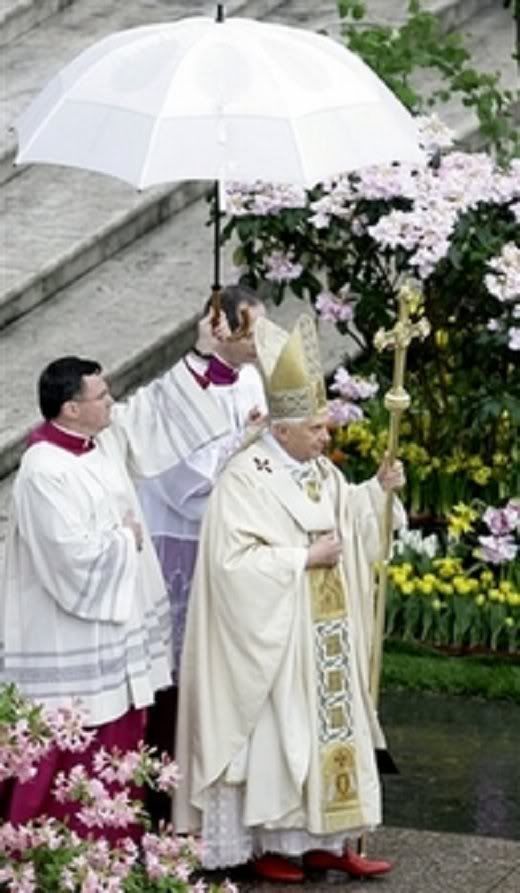
Religious freedom has been a theme of this year's Easter celebrations. At Saturday's Easter vigil, the pope baptised a former Muslim and a critic of Islamic extremism, journalist Magdi Allam.
Good Friday's Way of the Cross procession was marked by meditations penned by outspoken Hong Kong Cardinal Joseph Zen, who referred to the "martyrs" among China's tiny Catholic minority.
Zen is a key figure for Asian Catholics including those in China who are split between the official and clandestine Catholic churches.
After the mass, the Pope was to deliver the traditional "urbi et orbi" (to the city and the world) blessing, an occasion to speak out about conflicts and ills besetting the planet.
He was to read out the message in Italian, then offer Easter greetings in 63 languages including Esperanto to the pilgrims in the rain-soaked square and millions of others watching live broadcasts in 67 countries.
Allam, 55, an editorial writer and deputy publisher of the Corriere della Sera newspaper, wrote a letter to the paper published Sunday in which he branded his former faith as intrinsically violent.
"I had to do this (abandon Islam)", Allam wrote. "Beyond ... the phenomenon of extremists and Islamist terrorism at the global level, the root of evil is inherent to a physiologically violent and historically conflictual Islam."
In its relations with Islam and other religions the Vatican has stressed both freedom of religion and the right to convert to another faith.
Observers noted the Pope's penchant for liturgical objects that have not been used since the reforms of the Second Vatican Council in the 1960s, saying he favours continuity over a rupture with the past.
On Sunday, Benedict XVI carried a pastoral staff with a cross at the top which was used by Popes Pius XII and John XXIII, instead of the silver staff with Christ on the Cross that had been used by Paul VI and was especially associated with Benedict's predecessor John Paul II.
For the Palm Sunday mass a week ago, Benedict wore replicas of the vestments used by 16th-century pope Leo V Medicis.
Last September the 16th-century mass in Latin known as the Tridentine Mass was revived as a option for Roman Catholic churches, capping a long campaign that threatened to divide the Church.
The Mass had been discarded by Vatican II. [NO! Only by the liturgical reformists!]
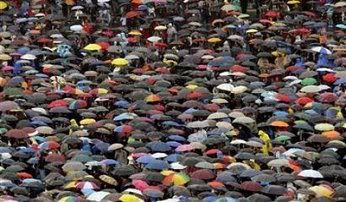 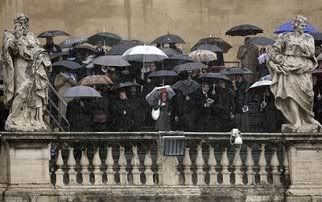
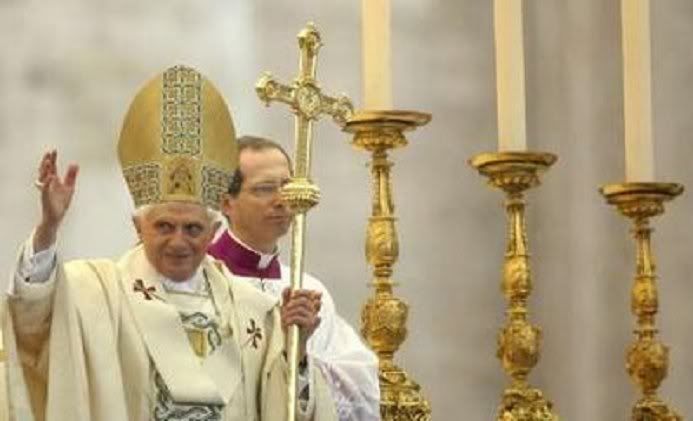 EASTER MESSSAGE 'URBI ET ORBI'
EASTER MESSSAGE 'URBI ET ORBI'
POPE DELIVERS MESSAGE FROM THE ALTAR
NOT FROM THE LOGGIA OF ST. PETER'S
Pope Benedict XVI today decided to deliver the traditional message from the altar where he had just said Easter Mass instead of doing it from the central loggia of St. Peter's Basilica as is traditional.
APCOM reports that the Pope made the decision in order to minimize the time that the faithful in St. Peter's Square had to spend under the rain, which fell heavily and without interruption during the Mass.
He referred to the rain in off-the-cuff remarks before delivering his message, saying: "Let us pray for joy among us all despite these circumstances. Even these dark clouds are like light today. Even with the rain, the fact is that the Lord is risen!"
"Anche sotto la pioggia, rimane vero che il Signor è risorto!":
This afternoon, the Pope is leaving for Castel Gandolfo to spend a few days of rest after the event-filled Holy Week. He will lead the noonday Regina Caeli (the prayer said in place of the Angelus durign the Easter period) from the summer residence there.
Pope urges 'solutions' for peace
in Tibet, Mideast, Africa
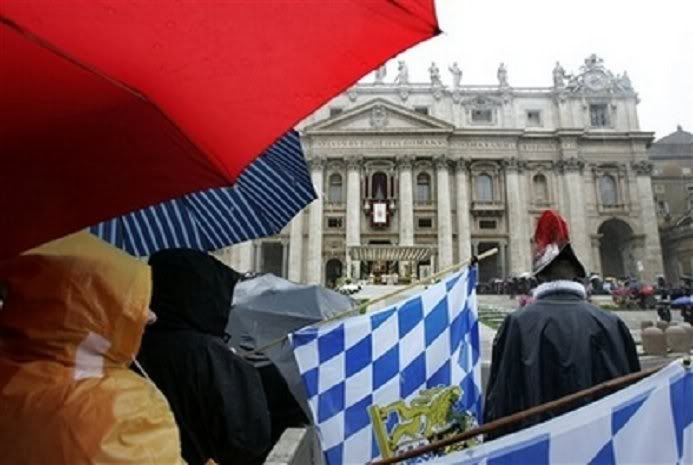
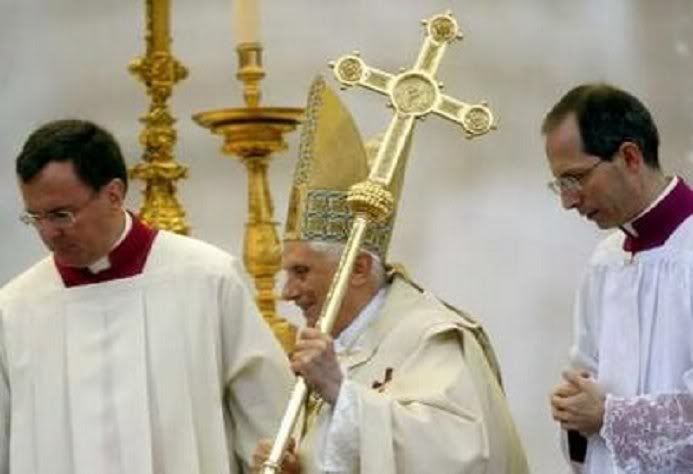
VATICAN CITY, Mar. 23 (AFP) - Pope Benedict XVI on Sunday urged "solutions that will safeguard peace and the common good" in Tibet, the Middle East and Africa during his traditional Easter message.
"How can we fail to remember certain African regions, such as Darfur and Somalia, the tormented Middle East, especially the Holy Land, Iraq, Lebanon, and finally Tibet, all of whom I encourage to seek solutions that will safeguard peace and the common good!" the pope said in his "urbi et orbi" (to the city and the world) message.
Speaking as pilgrims in St Peter's Square braved a steady rain, the head of the world's 1.1 billion Catholics wished that "the light that streams forth from this solemn day (may) shine forth in every part of the world."
Easter Sunday celebrates the Resurrection of Christ after his crucifixion on Good Friday.
On Wednesday the pope broke his silence on the crisis in Tibet, calling for for an end to violence there and urging "dialogue and tolerance."
Beijing brushed off the appeal, according to Italian press reports that quoted foreign ministry spokesman Qin Gang as saying Thursday: "Supposed tolerance cannot exist for criminals who should be punished by the law."
Following the "urbi et orbi" message, the pope offered Easter greetings in 63 languages to the tens of thousands of pilgrims in St Peter's Square and millions of viewers in 67 countries around the world.
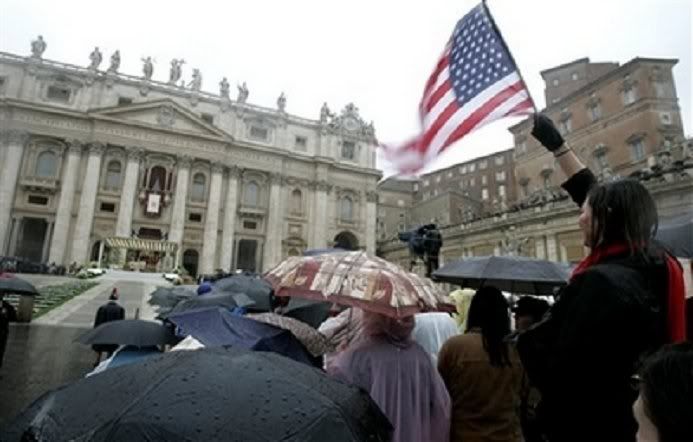
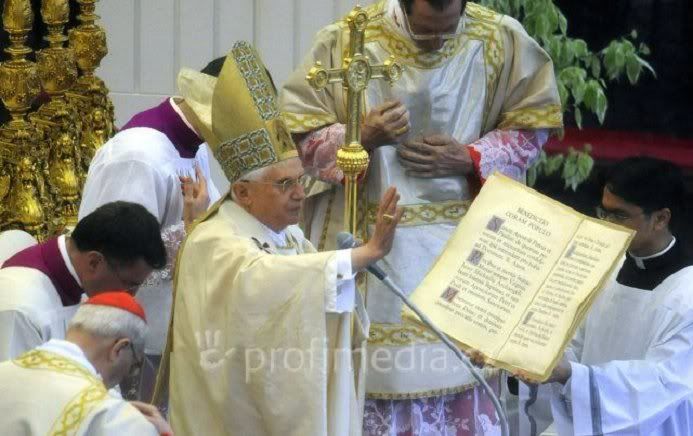
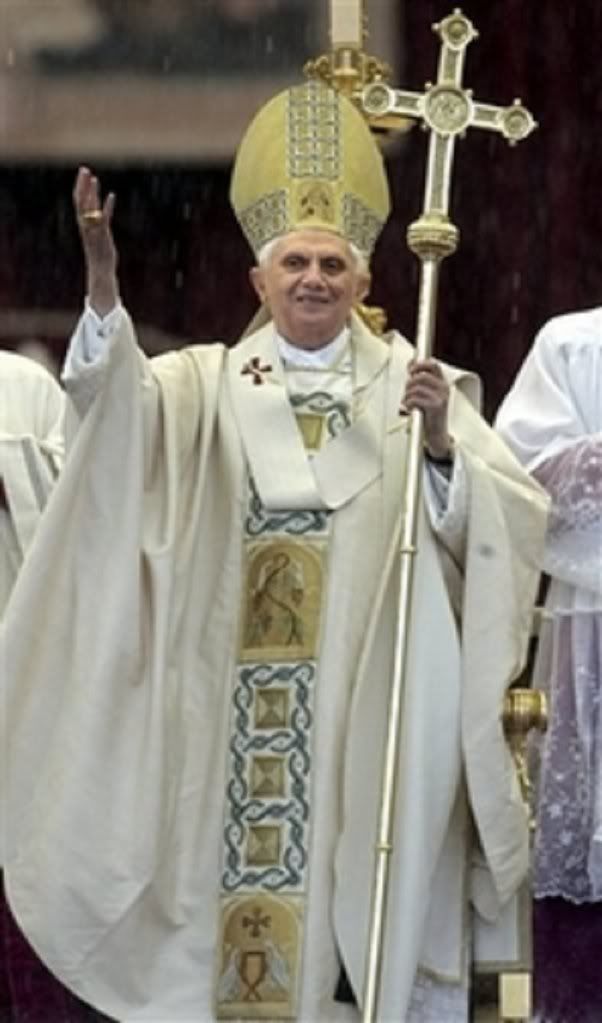 Pope's Easter message
Pope's Easter message
calls for peace
By Philip Pullella
VATICAN CITY, Mar. 23 (Reuters) - Pope Benedict called in his Easter message on Sunday for an end to injustice, hatred and violence around the world, including in Tibet, Iraq and Darfur.
The Pope, who turns 81 next month, celebrated an Easter Mass for tens of thousands of people in driving rain in St Peter's Square as Christians around the world commemorated Christ's resurrection.
The wind and rain that has whipped most of Europe did not spare Rome as the German pontiff, wearing white and gold vestments, said Mass while the crowd huddled under umbrellas.
The Pope himself was sheltered by a canopy but cardinals, diplomats and altar boys were drenched.
In his twice-yearly "Urbi et Orbi" (to the city and the world) message delivered after the Mass, the Pope decried "the many wounds that continue to disfigure humanity in our own day."
"These are the scourges of humanity, open and festering in every corner of the planet, although they are often ignored and sometimes deliberately concealed; wounds that torture the souls and bodies of countless of our brothers and sisters," he said.
He called for "an active commitment to justice ... in areas bloodied by conflict and wherever the dignity of the human person continues to be scorned and trampled" before wishing the world a happy Easter in 63 languages.
"It is hoped that these are precisely the places where gestures of moderation and forgiveness will increase!," he said, specifically mentioning Darfur, Somalia, the Holy Land, Iraq, Lebanon and Tibet.
It was his second appeal in less than a week for calm in Tibet. In both cases he did not mention China, with which the Vatican has tense relations.
In a surprise move, the Pope, at an Easter vigil mass on Saturday night, baptized Muslim-born convert Magdi Allam, 55, an outspoken journalist and fierce critic of Islamic extremism. [The surprise is only that Allam was among the catechumens baptized last night. Baptism of catechumens is a traditional part of the Easter Vigil Mass.]
The Egyptian-born Allam's conversion to Christianity -- he took the name "Christian" for his baptism -- was kept secret until the Vatican disclosed it in a statement less than an hour before the Saturday night service began.
Allam, who is a strong supporter of Israel, is under police protection following threats against him.
"For the Catholic Church, each person who asks to receive baptism after a deep personal search, a fully free choice and adequate preparation, has a right to receive it," the statement said.
Allam defended the Pope in 2006 when the pontiff made a speech in Regensburg, Germany, that many Muslims perceived as depicting Islam as a violent faith.
The Vatican statement announcing Allam was joining Catholicism said all newcomers were "equally important before God's love and welcome in the community of the Church."
Allam, who has been living in Italy for 35 years, has said he was never a very devout Muslim. Still, his conversion to Christianity came as a surprise.
"What amazes me is the high profile the Vatican has given this conversion," Yaha Sergio Yahe Pallavicini, vice-president of the Italian Islamic Religious Community, told Reuters.
EASTER WRAP-UP
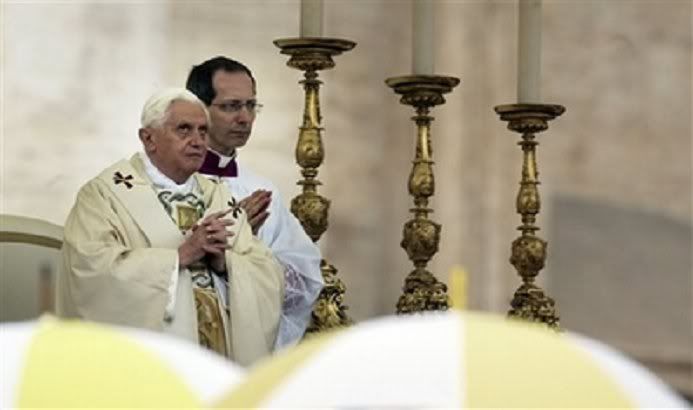
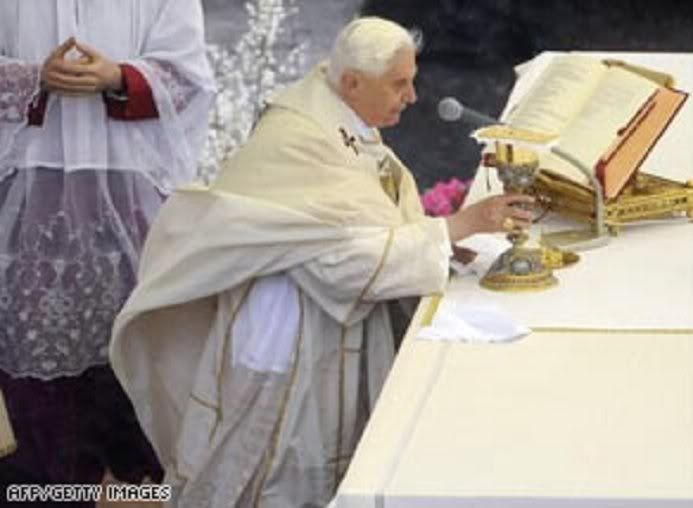
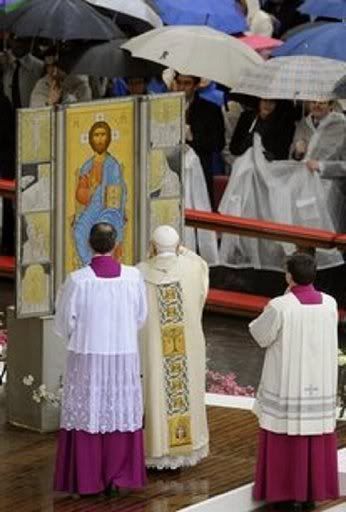 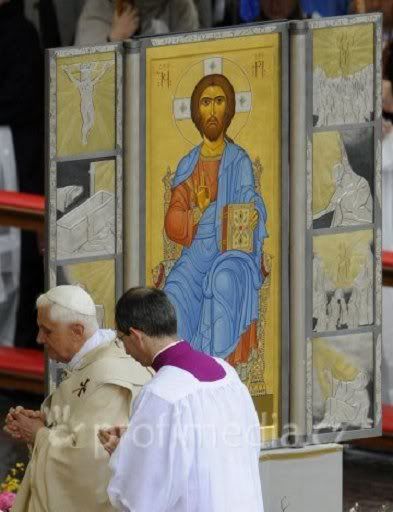 Pope Benedict XVI
Pope Benedict XVI
celebrates Easter
Vatican City, Mar. 23 (dpa) - Pope Benedict XVI marked Easter Sunday Mass in St Peter s Square with a message that called for the peaceful resolution of conflicts in Africa, the Middle East and Tibet.
"Dear brothers and sisters! Let us allow the light that streams forth from this solemn day to enlighten us; let us open ourselves in sincere trust to the risen Christ, so that his victory over evil and death may also triumph in each one of us, in our families, in our cities and in our nations," the Pontiff said.
"How can we fail to remember certain African regions, such as Dafur and Somalia, the tormented Middle East, especially the Holy Land, Iraq, Lebanon, and finally Tibet, all of whom I encourage to seek solutions that will safeguard peace and the common good!"
Benedict told the faithful gathered in the square and those following the ceremony in the 57 countries where it was being broadcast on television.
During the Mass the Pontiff wore a golden embroidered cope, or mantle once worn by Pope Benedict XV, whose 1914-22 pontificate was marked by World War I - a conflict which that Pope had tried in vain to bring to an end through mediation.
"May the grace and joy of the Risen Christ be with you all," Benedict said in his Easter greeting which he repeated in 63 languages, including Arabic, Chinese, Swahili and his native German.
He then ended the ceremony with the delivery of his traditional Urbi et Orbi blessing "to the city and the world" which was followed by applause and cheering from the tens of thousands of people packed the famous Roman square despite the cold, wet conditions.
The ceremony brought to a climax four days of intensive Easter- related commemorations involving the 80-year-old pontiff, leader of the world's 1.1 billion Catholics.
Benedict presided over a Easter Vigil inside the Vatican Basilica late on Saturday and the traditional Via Crucis (Way of the Cross) procession around the Coliseum on Good Friday, opting out however from his scheduled carrying of a wooden cross for a portion of the walk.
The theme of religious freedom dominated the Via Crucis proceedings which were accompanied by meditations penned by outspoken Hong Kong Cardinal Joseph Zen, a key figure for Asian Catholics including those in China who are split between a Beijing-sanctioned church and an underground Catholic community loyal to the Pope.
Benedict began the Easter-related commemoration on Holy Thursday when he washed the feet of 12 priests in a traditional gesture commemorating Jesus's act of humility with the disciples at the Last Supper. [The Easter-related liturgies actually began earlier Thursday with the morning Mass of the Chrism comemorating Christ's institution of priesthood.]
At the Easter Vigil ceremony Benedict administered sacraments to seven converts, including baptism rites to a well-known Italian journalist and former self-described "moderate Muslim," Magdi Allam.
The surprise inclusion of the Egyptian-born Allam - who has been under police protection since 2003 following threats, allegedly from Muslim extremists - among the group prompted one prominent Italian Muslim leader to question the Vatican's decision to handle the conversion in such a high-profile way.
The Vatican in its relations with Muslims has repeatedly stressed for reciprocity, urging respect for people to convert to Christianity and for Christians to worship freely in majority Muslim nations.
Many Muslims view abandoning Islam for another faith as apostasy, with some saying it should be punishable by death.
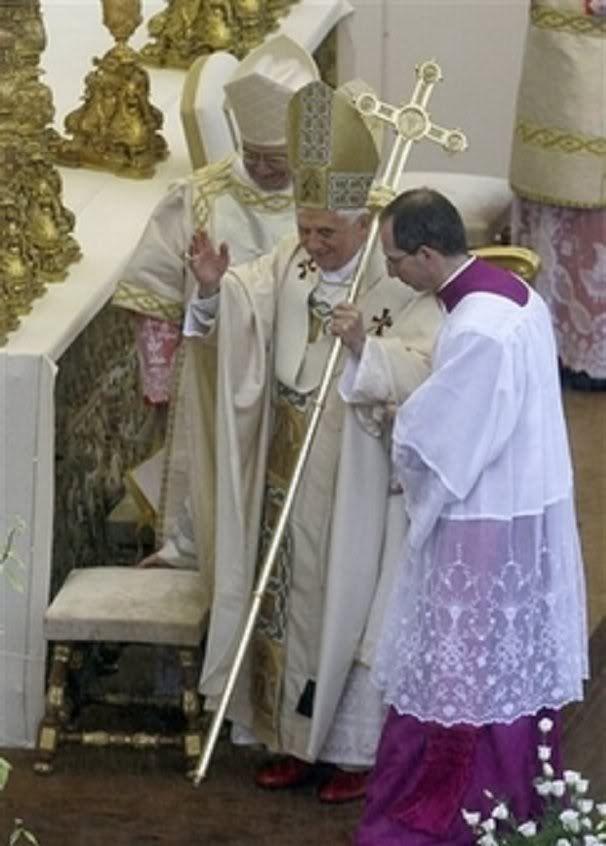 Pope prays for peace
Pope prays for peace
on Easter Sunday
By IAN FISHER
The New York Times
For March 24, 2008
VATICAN CITY — Pope Benedict XVI led prayers for peace on the holiest day of the Christian year at a rainy outdoor Mass here Easter Sunday, exulting conversions to the faith hours after the Vatican highlighted the baptism of Italy’s most prominent Muslim.
Pope Benedict XVI delivered the benediction on Easter Sunday. In a prayer before thousands of soaking pilgrims and tourists on St. Peter’s Square, the Pope noted that the disciples had spread the message of Christ’s resurrection — celebrated on Sunday — and as a result “thousands and thousands of persons converted to Christianity.”
“This is a miracle which renews itself even today,” he said.
Days after Osama bin Laden issued a threat against Europe that mentioned the pope specifically, Magdi Allam, an Egyptian-born writer protected by Italian bodyguards for his criticism of radical Islam, was baptized by the pope Saturday night and received his first communion.
The news about Mr. Allam, a secular Muslim married to a Catholic, was accented by a Vatican press release an hour before the baptism ceremony.
“It was the most beautiful day of my life,” Mr. Allam, 55, a deputy editor at Italy’s largest daily newspaper, Corriere della Sera, wrote in a column on Sunday. “The miracle of the resurrection of Christ reverberated in my soul, freeing it from the shadows of a preaching where hate and intolerance toward he who is different, toward he who is condemned as an ‘enemy,’ prevailed over love and respect for your neighbor.”
Mr. Allam said that he would take the new middle name of “Cristiano.”
Easter Sunday culminates the busiest week of the year at the Vatican, with scores of masses and ceremonies marking the days in which Jesus Christ was arrested, crucified and resurrected two days later.
Along with Christmas, Easter is a day on which the Pope delivers his “Urbi et Orbi” address, to “the city and the world.”
As is tradition, the 80-year-old Pope prayed for peace in troubled parts of the world, singling out Darfur in Sudan and Somalia, “the tormented Middle East, especially the Holy Land, Iraq, Lebanon.”
He also mentioned Tibet, a sensitive issue for the Vatican, which is working to improve ties with China, amid unconfirmed reports of direct talks here last week between Chinese and Vatican officials.
“How often relations between individuals, between groups and between peoples are marked not by love but by selfishness, injustice, hatred and violence,” the Pope said. “These are the scourges of humanity, open and festering in every corner of the planet, although they are often ignored and sometimes deliberately concealed; wounds that torture the souls and bodies of countless of our brothers and sisters.”
Though it was difficult to hear the Pope as the rain thumped off umbrellas and cascaded down from Bernini’s colonnades, the Pope, kept dry under a canopy in front of St. Peter’s Basilica, delivered Easter greetings in 63 languages, from Italian to Thai, Esperanto to Latin.
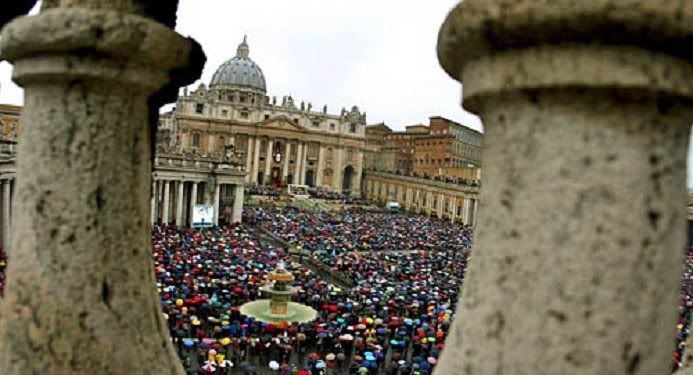
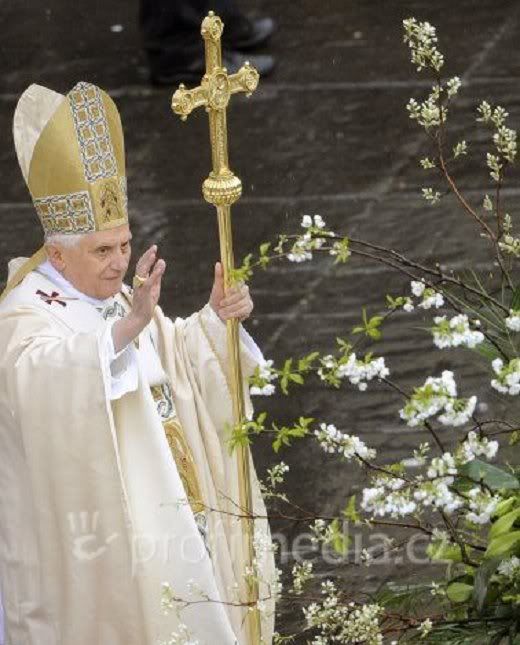 Pope Benedict's
Pope Benedict's
Easter Sunday plea for peace
By Tracy Wilkinson,
Los Angeles Times
March 23, 2008
VATICAN CITY -- Decrying modern "wounds that disfigure humanity," Pope Benedict XVI made a rain-soaked plea on Easter Sunday for the "moderation and forgiveness" that can bring peace to troubled parts of the world, especially the Middle East and Tibet.
Tens of thousands of umbrella-toting pilgrims and tourists gathered in St. Peter's Square to hear the Pope's Easter Mass as Christians around the world celebrated their holiest day, when they believe Jesus was resurrected.
Injustice, hatred and violence "are the scourges of humanity, open and festering in every corner of the planet," the Pope said in his traditional twice-a-year "Urbi et Orbi" (to the city and the world) message at the conclusion of today's Roman Catholic Mass.
He urged Tibet, Africa and the Middle East to "seek solutions that will safeguard peace and the common good."
Cold wind whipped priests' cassocks and brightly colored tulips decorating the square, and rain drenched the gathered worshipers, diplomats and the feather plumes of the Swiss Guards. The Pope himself was protected under a large white canopy above the altar.
But perhaps the most unusual element of the Vatican's Easter celebration was the attention being showered on the conversion from Islam to Christianity of a controversial Egyptian-born Italian newspaper editor.
Benedict, who baptized the journalist, Magdi Allam, in Saturday night's Mass, said a prayer today during the Easter service that praised the "miracle" of conversions.
Allam, who is married to a Catholic, has angered Muslims by supporting Israel.
[Modificato da TERESA BENEDETTA 24/03/2008 06:08] |
 23/03/2008 22:04 23/03/2008 22:04 |
|
| | | OFFLINE | | Post: 12.535 | Registrato il: 28/08/2005
| Utente Gold | |
|
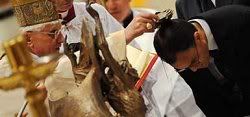 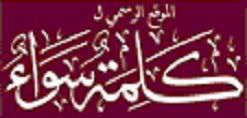   Pope risks Muslim anger
Pope risks Muslim anger
by baptising controversial journalist
By Richard Owen in Rome
The Times of London
March 23, 2008
This time, Richard Owen of the Times of London has cast the first stone openly intended to provoke controversy and most probably, extreme reaction from extremists, with regard to Magdi Allam's 'public baptism' last night by Pope Benedict XVI. Compare his inflammatory reporting - and the headline - to that of the New York Times and the Los Angeles Times above, as well as AP's separate story on Allam's baptism below.
This is actually the Times of London's wrap-up story of Easter at the Vatican, and yet Owen chose to devote all but the last 6 paragraphs of the story to the Allam angle.
Pope Benedict XVI has risked a renewed rift with the Muslim world by baptising a converted Muslim born journalist who describes Islam as intrinsically violent and characterised by "hate and intolerance" rather than "love and respect for others".
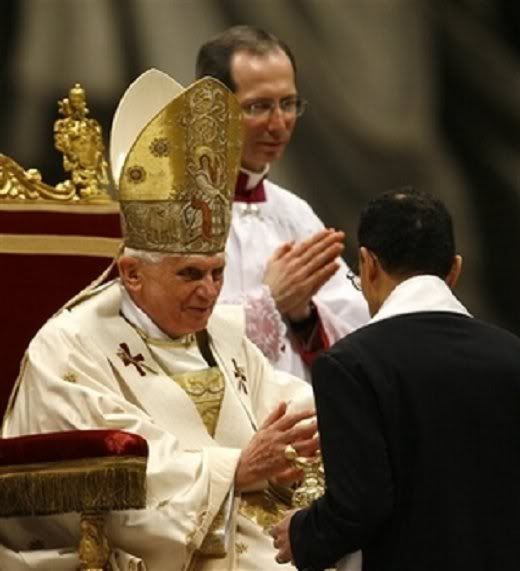 Allam is confirmed by the Pope. All 7 new Catholics baptized last night also received
Allam is confirmed by the Pope. All 7 new Catholics baptized last night also received
the sacraments of Confirmation and the Eucharist from the Pope.
In a surprise move at the Easter vigil at St Peter's on Saturday night, the Pope baptised Magdi Allam, 55, an outspoken Egyptian-born critic of Islamic extremism and supporter of Israel, who has been under police protection for five years following death threats against him over his criticism of suicide bombings.
Mr Allam's conversion was kept secret until less than an hour before the service. He took the middle name "Christian" for his baptism.
The Vatican said: "For the Catholic Church, each person who asks to receive baptism after a deep personal search, a fully free choice and adequate preparation, has a right to receive it."
After the baptism, the Pope said that faith "is a force for peace and reconciliation in the world: distances between people are overcome, in the Lord we have become close."
However the move revived memories of the Muslim fury which greeted Pope Benedict's speech at Regensburg University in German in 2006 in which he appeared to brand Islam as inherently violent, inhumane and irrational by quoting a Byzantine emperor to that effect.
[Apart from the fairly objective remark of an Italian Muslim leader Yahya Pallavicini, there have been no other publizhed reactions so far from the Muslim world. But there were no reactions either to the Regensburg lecture for the first 48 hours after the lecture was given].
He has since sought to make amends, praying in a mosque in Turkey and establishing a permanent forum for Catholic-Muslim dialogue to be inaugurated in November. His talks last November with King Abdullah in Rome have led to exploratory discussions on opening a church in Saudi Arabia, where at present all faiths other than Islam are banned.
However, in a combative article for Corriere della Sera, the Italian paper of which he is a deputy editor, Mr Allam - who has lived in Italy most of his adult life and has a Catholic wife - said his soul had been "liberated from the obscurantism of an ideology which legitimises lies and dissimulation, violent death, which induces both murder and suicide, and blind submission to tyranny".
Instead he had "seen the light" and joined "the authentic religion of Truth, Life and Liberty". He added: "Beyond the phenomenon of extremists and Islamist terrorism at the global level, the root of evil is inherent in a physiologically violent and historically conflictual Islam."
Mr Allam, who was educated at a Salesian Catholic school in Egypt and and previously described himself as a "not very devout" Muslim, was one of seven adults baptised during the Easter vigil, which is traditionally used for adult conversion ceremonies.
He said that by baptising him publicly the Pope had "sent an explicit and revolutionary message to a Church that until now has been too cautious in the conversion of Muslims because of the fear of being unable to protect the converted, who are condemned to death for apostasy".
He added: "Thousands of people in Italy have converted to Islam and practise their faith serenely. But there are also thousands of Muslims who have converted to Christianity but are forced to hide their new faith out of fear of being killed by Islamist terrorists."
Muslim groups in Italy said Mr Allam would have done better to have undergone a low key conversion at a local parish. "What amazes me is the high profile the Vatican has given this conversion," said Yaha Sergio Yahe Pallavicini, deputy head of the Italian Islamic Religious Community.
Today, Pope Benedict celebrated Easter Mass from under a canopy in torrential rain on St Peter's Square, calling for an end to "injustice, hatred and violence." Many of the tens of thousands on the square huddled under umbrellas but others were soaked in the downpour, including Swiss Guards, altar boys and Italian army and police bandsmen.
The Pope made several impromptu references to the weather, saying with a smile that it could not dampen the joy of Christians at Christ's Resurrection.
He offered Easter blessings in 63 languages, and in his "Urbi et Orbi" (to the city and the world) message called for "solutions that will safeguard peace and the common good" in Tibet, the Middle East and African regions such as Darfur and Somalia.
He deplored "the many wounds that continue to disfigure humanity in our own day. These are the scourges of humanity, open and festering in every corner of the planet, although they are often ignored and sometimes deliberately concealed; wounds that torture the souls and bodies of countless of our brothers and sisters".
He called for "an active commitment to justice in areas bloodied by conflict and wherever the dignity of the human person continues to be scorned and trampled", adding - with a wry reference to the dark storm clouds overhead - "May the light that streams forth from this solemn day shine forth in every part of the world".
Last week, the Pope broke his silence on Tibet, calling for for an end to violence and urging "dialogue and tolerance." But Beijing brushed off the appeal, declaring there was "no tolerance for criminals, who will be punished by the law." Neither the Easter message nor the Good Friday meditations specifically mentioned China, a reflection of the Vatican's desire not to upset its dialogue with Beijing over the fate of the country's Catholics.
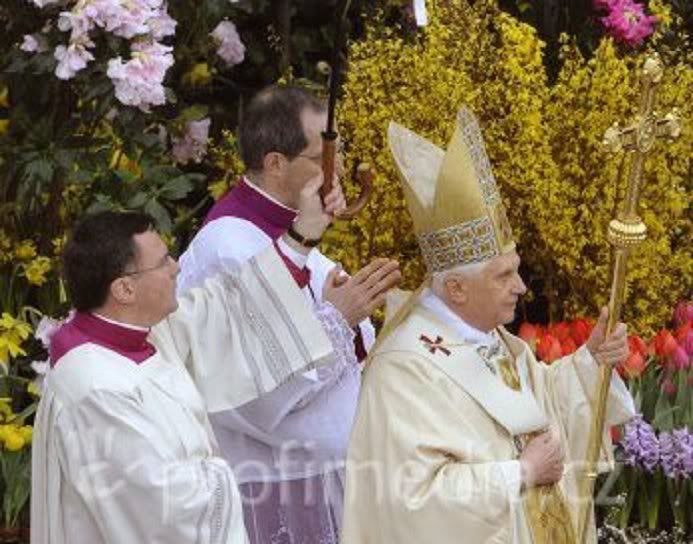 Pope praised by prominent
Pope praised by prominent
convert from Islam
ROME, Mar. 23 (AP) - A high-profile Muslim commentator in Italy recounted Sunday how Pope Benedict XVI was instrumental in his decision to convert to Catholicism.
Magdi Allam, a top editor for the Corriere della Sera newspaper, praised the Pontiff - himself under fire from militant Islam - for defending civilization.
The surprise baptism of Allam by the Pope during the Easter vigil Mass in St. Peter's Basilica Saturday night highlighted tensions that have at times characterized the theologian-pope's relationship with the Muslim world.
 Allam receives his First Communion from the Pope.
Allam receives his First Communion from the Pope.
Allam, 55, was born a Muslim in Egypt, but was educated by Catholics and says he has never been a practicing Muslim.
In a front-page letter in Corriere, he described how Benedict helped in his decision to break with Islam, a process which included support from a Vatican cardinal and several prelates close to the Vatican.
«Undoubtedly the most extraordinary and significant encounter in the decision to convert was that with Pope Benedict XVI,» Allam said.
He said he admired the Pope for his skill in laying out the relationship «between faith and reason as the basis of authentic religion and human civilization.
The Pope himself has come under verbal attack from Islamic militants.
Al-Qaida leader Osama bin Laden, in a new audio message posted last week, accused Benedict of playing a role in what he called a «new Crusade» against Islam. The Vatican has described the accusation as baseless.
The Vatican is still trying to repair relations with the Muslim world after Benedict in a 2006 speech about faith and reason cited a medieval text that described some of the teachings of the Prophet Muhammad as «evil and inhuman,» particularly the command to spread the faith by the sword.
The Pope later expressed regret that his remarks angered Muslims and stressed that the text didn't reflect his own opinion.
Allam predicted his conversion would spark an «even graver condemnation to death for apostasy,» or renunciation of religious faith.
Hamas singled him out for death after he criticized Palestinian suicide bombings, and Italy provides him with a security escort.
But under a widespread interpretation of Islamic legal doctrine, converting from Islam is apostasy and punishable by death - though killings are rare.
Benedict made no specific mention of Allam's conversion, but at his Easter Sunday Mass in St. Peter's Square, the Pope hailed conversions to Christianity as a 'miracle'.
By baptizing him, in a ceremony televised to millions of people worldwide, Benedict was making «an historic and courageous gesture» to a Church «which up to now had been too prudent in the conversion of Muslims, refraining from proselytizing in countries with Muslim majorities, and being silent about the reality of converts (from Islam) in Christian countries.
Allam contended that the Church was afraid it couldn't protect the new converts from possible retaliation by Muslims and also worried about Christians living in Islamic countries.
In November, Benedict raised concerns about restrictions on worship by non-Muslims in Saudi Arabia, when he held the first ever meeting between a Pontiff and a reigning Saudi King. In his meeting with King Abdullah he lauded the contribution of Christians in Saudi Arabia, where Christians are barred from opening churches.
Allam wrote that it was «time to put an end to the violence of Muslims who do not respect the freedom of religious choice".
His conversion freed him «from the shadows of a preaching where hate and intolerance toward he who is different, toward he who is condemned as an 'enemy'," Allam said.
The Union of Islamic Communities in Italy - which Allam has frequently criticized as having links to Hamas - was quoted as describing the baptism as a personal choice.
An Italian Muslim leader, Yahya Pallavicini, who has been involved with Vatican-Muslim dialogue, expressed perplexity.
«As a European Muslim, there was no reason to deny his religion of origin in order to love better or more the Christ figure or Christianity,» Pallavicini told Italy's SKY TG24.
The conversion became political fodder ahead of Italy's elections next month. Rejoicing over the conversion was Roberto Calderoli, a leader of the anti-immigrant Northern League party that is an ally of Silvio Berlusconi, the conservative bloc's candidate for the premiership.
The Vatican cardinal in charge of inter-religious dialogue appeared to dismiss any flap over Allam's conversion.
«To whoever knocks, the door of the Church is always open,» Cardinal Jean-Louis Tauran was quoted by the Apcom news agency as saying. «Freedom of conscience is a fundamental right."
[Modificato da TERESA BENEDETTA 25/03/2008 00:48] |
 24/03/2008 05:48 24/03/2008 05:48 |
|
| | | OFFLINE | | Post: 12.544 | Registrato il: 28/08/2005
| Utente Gold | |
|

 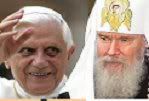 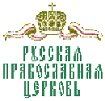 Alexy-II sends Easter greetings
Alexy-II sends Easter greetings
VATICAN CITY, MARCH 23, 2008 (Zenit.org).- Orthodox Patriarch Alexy II of Moscow and All Russia sent Easter greetings to Benedict XVI, which highlighted the optimism and joy implicit in the message of Christianity.
Vatican Radio reported that in the message Alexy II addresses “with his entire soul greetings of joy, health, divine benediction for a Holy Easter” to the Pope.
The contemporary world, the message continues, “places us before many difficulties and challenges. In many countries and regions bloody conflicts continue, hostility between peoples becomes more grave, attempts to drive Christian values from life and society continue.”
“But if the reality that surrounds us is complex, Christians are called to defeat skepticism and all the disgraces and difficulties, taking inspiration from the joy of Easter and the words of Christ.”
The Itar-Tass agency reports Alexy II also addressed messages to the principal exponents of the Protestant confessions.
Orthodox Easter in Russia is celebrated, according to the Julian calendar, on April 27.
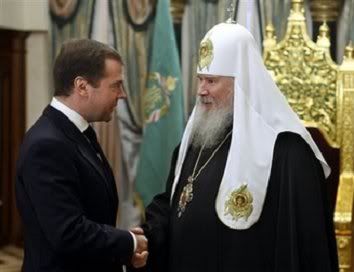 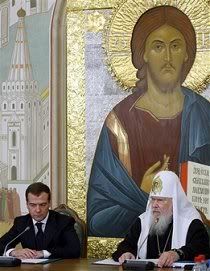 Alexy II welcomes Russian President-elect Dmitry Medvedev, prior to a meeting of the supervisory
Alexy II welcomes Russian President-elect Dmitry Medvedev, prior to a meeting of the supervisory
board, the board of trustees and the public council for The Russian Orthodox Encyclopedia at
the giant Christ the Savior Cathedral in Moscow, on Wednesday, March 19.
|
 24/03/2008 16:58 24/03/2008 16:58 |
|
| | | OFFLINE | | Post: 12.552 | Registrato il: 28/08/2005
| Utente Gold | |
|
THE POPE'S DAY
   A full translation of the Holy Father's words at the Regina Caeli today has been posted in
A full translation of the Holy Father's words at the Regina Caeli today has been posted in AUDIENCE & ANGELUS TEXTS.
'REGINA CAELI'
AT CASTEL GANDOLFO
The Vatican says the Holy Father arrived in Castel Gandolfo yesterday afternoon for a brief period of rest following the Holy Week activities.
At noon, he came to the balcony of the Apostolic Residence overlooking the inner courtyard to lead the Regina Caeli prayers (which take the place of the Angelus during Eastertide - the time between Easter and Pentecost.
The noonday event was also broadcast directly to St. Peter's Square at the Vatican for the crowd gathered there.
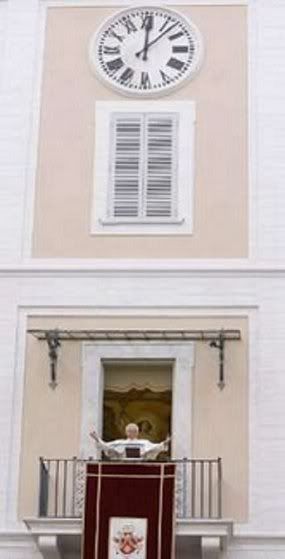 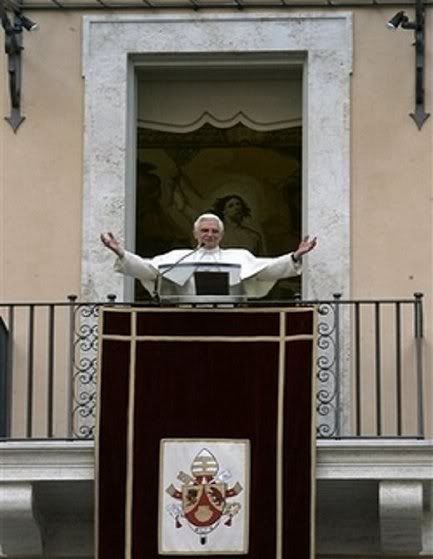
In his brief homily, Pope Benedict explained the meaning of the Hebrew word Alleluia, universally used to say "Praise the Lord", saying the Resurrection has imprinted Alleluia forver in the heart of the Church and her faithful.
He also spoke about the Regina Caeli, an antiphon to Mary, calling it a new 'annunciation', not from the angel, but from the Christian world that rejoices at the resurrection of her Son.
After the prayers and his greetings to various language groups, he ended with a reminder about two causes remembered today - the Day of Missionary Martyrs, and a World Day against Tuberculosis.
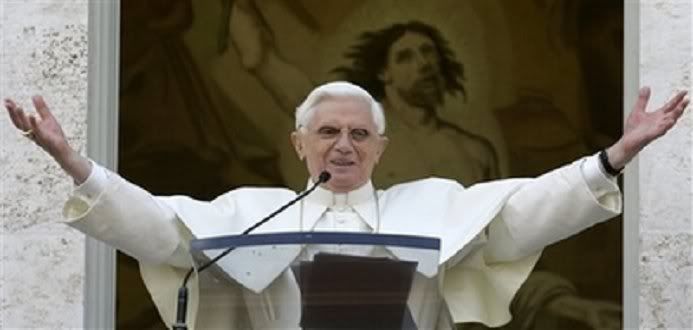 Pope sends message to sick
Pope sends message to sick
on world TB day
CASTEL GANDOLFO, Italy, Mar. 24 (AFP) - Pope Benedict XVI said he was "particularly close" to those sick with tuberculosis following Easter prayers which coincide with the World Tuberculosis Day.
"During this world day to fight tuberculosis, I am particularly close to those who are sick and their families and hope to increase global engagement against this scourge," Benedict said at his Castel Gandolfo residence near Rome.
"My appeal is first directed to all the Catholic institutions so that those who suffer can realise, through their actions, that the Lord has risen so he can offer them healing, comfort and peace," the pope told pilgrims.
The World Health Organisation warned in a report published last week that new TB cases are slipping through the detection net, as countries fail to keep up with rapid progress made in earlier years.
According to the WHO, some 9.2 million new cases of TB were detected against 9.1 million in 2005 -- but it also said only 61 percent of all TB cases worldwide are registered.
Including the estimates of non-detected cases, the WHO reported, there were 14.4 million cases in 2006 of TB -- an eminently curable disease.
Altogether, it said, TB killed more than 1.7 million people in 2006, including some 230,000 people who also suffered from HIV/AIDS, the organisation said.
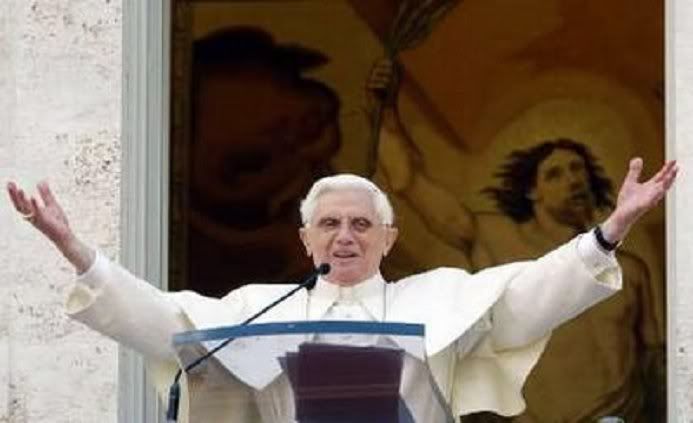
=====================================================================
THE POPE MOURNS THE DEATH
OF A MEXICAN CARDINAL
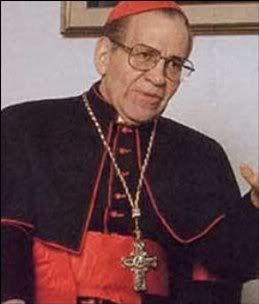
The Vatican has released the text of the telegram sent by the Holy Father to Cardinal Francisco Robles Ortega, Archbishop of Monterrey, Mexico, on the death last Saturday, March 22, of Cardinal Adolfo Antonio Suárez Rivera, emeritus Archbishop of Monterrey. He died of a cerebral hemorrhage. He was 81.
Here is a translation from the Spanish:
To His Eminence
Most Reverend Cardinal Francisco Robles Ortega
Archbishop of Monterrey (Mexico)
Profoundly saddened by the death of the beloved Cardinal Adolfo Antonio Suárez Rivera, emeritus Archbishop of Monterrey, I express my most heartfelt condolences to the Bishop and your auxiliaries, as well as to your clergy and the faithful of this particular Church and the family of the deceased prelate, whom I join in fervent prayers that the Lord may grant his peace to someone who has served the Church so intensely and generously during his pastoral ministry, first as the leader of the dioceses of Tepic and Tlalnepantla, and later, as Archbishop of the Metropolitan See.
In these moments of human pain, which the Paschal mystery of Christ illumines and fills with hope, I impart from the heart to all those who mourn this great loss a special Apostolic Blessing.
BENEDICTUS PP. XVI
[Modificato da TERESA BENEDETTA 24/03/2008 18:51] |
 24/03/2008 22:12 24/03/2008 22:12 |
|
| | | OFFLINE | Post: 1.314 | Registrato il: 27/11/2005
| Utente Veteran | |
|
Thanks for all the photos!!!! Great selection of photos from the Triduum! I only took a few and just one close up. You see, when we saw him very close up [about a foot away from us], both on Good Friday and at the Easter Vigil, we decided to concentrate on looking at him and soaking up his holiness [which shines out of him], rather than trying to get close up photos.
And talking of soaking, the photo which shows the "testudo" of umbrellas is really rather heart-warming, and I think I spotted my small blue umbrella!!!! One of my friends says the new canopy on the sagrato has underfloor heating -so we know Papa wasn't cold. It has different coloured little lights in its ceiling - a lovely effect and the lights are small so they don't look like overdone Christmas lights!
Update: Though my shoes are still wet in my suitcase [we walked through quite deep streams of water on our way back to the guest house after Mass yesterday], not one of us caught a cold. We are tough and our love for Jesus Christ and for Papa keeps us warm!!!!!
Pooh Bear is tough too! He enchoyed every moment of the long weekend!
Luff again - Mary xxxxxxxxxxxxxxx
Really MUST get to bed now and catch up on sleep!
![[SM=x40801]](http://www.vocinelweb.it/faccine/kaoani/pag2/38.gif) ![[SM=x40801]](http://www.vocinelweb.it/faccine/kaoani/pag2/38.gif) ![[SM=x40801]](http://www.vocinelweb.it/faccine/kaoani/pag2/38.gif) ![[SM=x40801]](http://www.vocinelweb.it/faccine/kaoani/pag2/38.gif) ![[SM=x40801]](http://www.vocinelweb.it/faccine/kaoani/pag2/38.gif) ![[SM=x40801]](http://www.vocinelweb.it/faccine/kaoani/pag2/38.gif) ![[SM=x40801]](http://www.vocinelweb.it/faccine/kaoani/pag2/38.gif) |
|
|
|
|